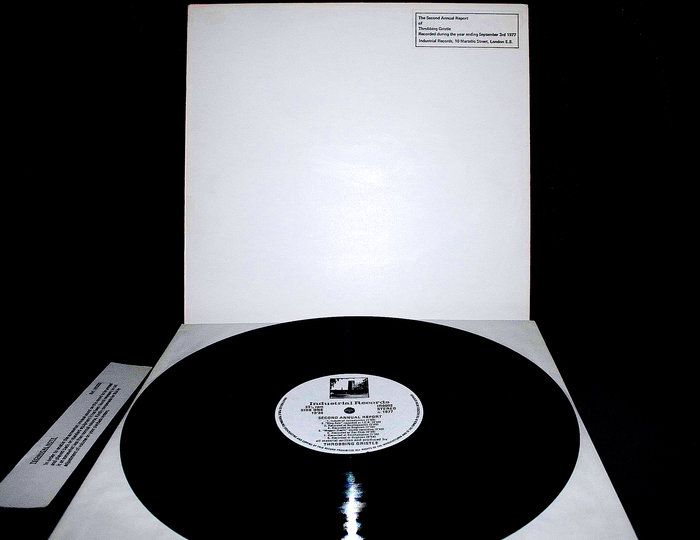Back to Category-Overview
Back to Category-Search
 0
0
Back to Category-Search
The Second Annual Report
Artist: Throbbing Gristle
Year: 1977
Country: United Kingdom
Label: Industrial Records
Catalog No: Industrial Records, IR0002
Format: Vinyl Lp
Spezification: lmtd 785
 0
0
Tracklist
A1
Industrial Introduction
1:02
A2 "Slug Bait" Recorded At I.C.A. 4:20
A3 Recorded At Southampton 2:45
A4 Recorded At Brighton 1:19
A5 "Maggot Death" Studio Recording 2:49
A6 Recorded At Rat Club 4:34
A7 Recorded At Southampton 1:35
A8 Recorded At Brighton 1:00
B The Original Soundtrack Of The Coum Transmissions Film Of "After Cease To Exist" 19:50
A2 "Slug Bait" Recorded At I.C.A. 4:20
A3 Recorded At Southampton 2:45
A4 Recorded At Brighton 1:19
A5 "Maggot Death" Studio Recording 2:49
A6 Recorded At Rat Club 4:34
A7 Recorded At Southampton 1:35
A8 Recorded At Brighton 1:00
B The Original Soundtrack Of The Coum Transmissions Film Of "After Cease To Exist" 19:50
Companies, etc.
- Pressed By – Sound Manufacturing – ? 2149
Credits
- Performer [For Throbbing Gristle] – Chris Carter (2), Cosey Fanni Tutti, Genesis P-Orridge, Peter Christopherson
- Written-By, Producer – Throbbing Gristle
Notes
Released as a limited edition of 785 copies.
A-side total duration is listed as 19:24 on label. Duration listed for track A8 is wrong. This track plays 1 minute instead of 9:54, this last duration being the sum of tracks A5 to A8.
Center labels are white with Death Factory Industrial Logo. Covers are plain white with small self adhesive sticker in top right hand corner on front; large sticker with sleeve notes stuck in center on back.
Enclosed is a small black and white sticker saying "Nothing Short Of A Total War", a red and black TG lightning flash sticker and a Xerox strip warning 'Technical Note' about the shortcomings of this pressing. Other copies come with a questionary sheet to return to Industrial Records, a square sheet and the Xerox strip warning.
© 1977
"...One side of this record has been assembled from tapes made at four out of the five live occasions and at the studio of Industrial Records in London. Side Two consists of the entire original movie soundtrack of a film produced by Coum Transmissions called "After Cease To Exist" premiered in Arnhem, Holland in July 1977 which Throbbing Gristle were invited to score and perform. It was recorded at the Industrial Records studio..."
"...All recordings were made in one take without any overdubs or any recording treatment other than standard playing procedures that we employ. Within the limitations of the recording techniques used the sound on this record is exactly as it was heard at the moment of its production..."
A-side total duration is listed as 19:24 on label. Duration listed for track A8 is wrong. This track plays 1 minute instead of 9:54, this last duration being the sum of tracks A5 to A8.
Center labels are white with Death Factory Industrial Logo. Covers are plain white with small self adhesive sticker in top right hand corner on front; large sticker with sleeve notes stuck in center on back.
Enclosed is a small black and white sticker saying "Nothing Short Of A Total War", a red and black TG lightning flash sticker and a Xerox strip warning 'Technical Note' about the shortcomings of this pressing. Other copies come with a questionary sheet to return to Industrial Records, a square sheet and the Xerox strip warning.
© 1977
"...One side of this record has been assembled from tapes made at four out of the five live occasions and at the studio of Industrial Records in London. Side Two consists of the entire original movie soundtrack of a film produced by Coum Transmissions called "After Cease To Exist" premiered in Arnhem, Holland in July 1977 which Throbbing Gristle were invited to score and perform. It was recorded at the Industrial Records studio..."
"...All recordings were made in one take without any overdubs or any recording treatment other than standard playing procedures that we employ. Within the limitations of the recording techniques used the sound on this record is exactly as it was heard at the moment of its production..."
Related Releases
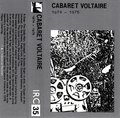 1974 - 1976
Cabaret Voltaire
1974 - 1976
Cabaret Voltaire20 Jazz Funk Greats Throbbing Gristle
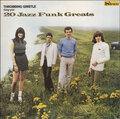 20 Jazz Funk Greats
Throbbing Gristle
20 Jazz Funk Greats
Throbbing Gristle 24 Hours
Throbbing Gristle
24 Hours
Throbbing Gristle A Career in Dancing
Another View
A Career in Dancing
Another View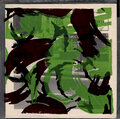 Adrenalin / Distant Dreams (Part Two)
Throbbing Gristle
Adrenalin / Distant Dreams (Part Two)
Throbbing Gristle All 5 Industrial Records Lp's (pictures with Second Annual)
Throbbing Gristle
All 5 Industrial Records Lp's (pictures with Second Annual)
Throbbing Gristle All 9 Industrial Records 7inches
Throbbing Gristle
All 9 Industrial Records 7inches
Throbbing Gristle All other 12 Industrial Records Cassettes (IRC25-35) plus later released IRC0 (Best of Volume 1)
Throbbing Gristle
All other 12 Industrial Records Cassettes (IRC25-35) plus later released IRC0 (Best of Volume 1)
Throbbing Gristle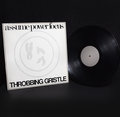 Assume Power Focus
Throbbing Gristle
Assume Power Focus
Throbbing Gristle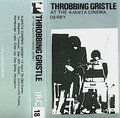 At Ajanta Cinema, Derby
Throbbing Gristle
At Ajanta Cinema, Derby
Throbbing GristleAt Ajanta Cinema, Derby Throbbing Gristle
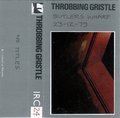 At Butlers Wharf, London 23rd December 1979
Throbbing Gristle
At Butlers Wharf, London 23rd December 1979
Throbbing Gristle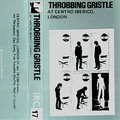 At Centro Iberico, London
Throbbing Gristle
At Centro Iberico, London
Throbbing Gristle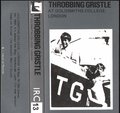 At Goldsmith's College, London
Throbbing Gristle
At Goldsmith's College, London
Throbbing Gristle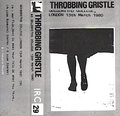 At Goldsmiths College, London 13th March 1980
Throbbing Gristle
At Goldsmiths College, London 13th March 1980
Throbbing Gristle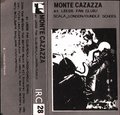 At Leeds Fan Club / Scala, London / Oundle School
Monte Cazazza
At Leeds Fan Club / Scala, London / Oundle School
Monte Cazazza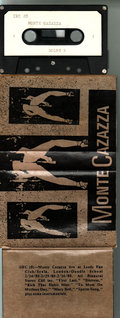 At Leeds Fan Club / Scala, London / Oundle School
Monte Cazazza
At Leeds Fan Club / Scala, London / Oundle School
Monte Cazazza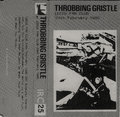 At Leeds Fan Club 24th February 1980
Throbbing Gristle
At Leeds Fan Club 24th February 1980
Throbbing Gristle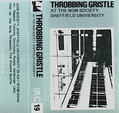 At Now Society, Sheffield University
Throbbing Gristle
At Now Society, Sheffield University
Throbbing Gristle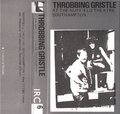 At Nuffield Theatre, Southampton
Throbbing Gristle
At Nuffield Theatre, Southampton
Throbbing Gristle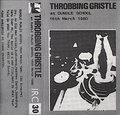 At Oundle Public School 16th March 1980
Throbbing Gristle
At Oundle Public School 16th March 1980
Throbbing Gristle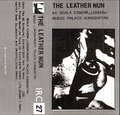 At Scala Cinema, London / Music Palais Kungsgatan
Leather Nun
At Scala Cinema, London / Music Palais Kungsgatan
Leather Nun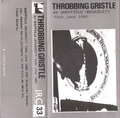 At Sheffield University 10th June 1980
Throbbing Gristle
At Sheffield University 10th June 1980
Throbbing Gristle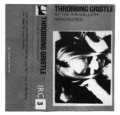 At The Air Gallery Winchester
Throbbing Gristle
At The Air Gallery Winchester
Throbbing Gristle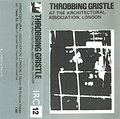 At The Architectural Association, London
Throbbing Gristle
At The Architectural Association, London
Throbbing Gristle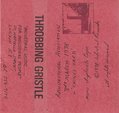 At The Architectural Association, London
Throbbing Gristle
At The Architectural Association, London
Throbbing Gristle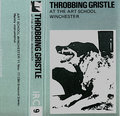 At The Art School Winchester
Throbbing Gristle
At The Art School Winchester
Throbbing Gristle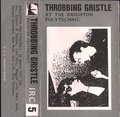 At The Brighton Polytechnic
Throbbing Gristle
At The Brighton Polytechnic
Throbbing Gristle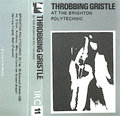 At The Brighton Polytechnic
Throbbing Gristle
At The Brighton Polytechnic
Throbbing Gristle At The Crypt Club, London
Throbbing Gristle
At The Crypt Club, London
Throbbing Gristle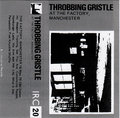 At The Factory, Manchester
Throbbing Gristle
At The Factory, Manchester
Throbbing Gristle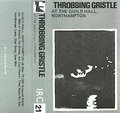 At The Guild Hall, Northampton
Throbbing Gristle
At The Guild Hall, Northampton
Throbbing Gristle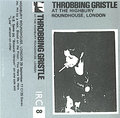 At The Highbury Roundhouse, London
Throbbing Gristle
At The Highbury Roundhouse, London
Throbbing Gristle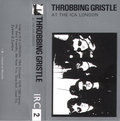 At The ICA London
Throbbing Gristle
At The ICA London
Throbbing Gristle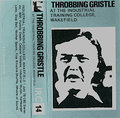 At The Industrial Training College, Wakefield
Throbbing Gristle
At The Industrial Training College, Wakefield
Throbbing Gristle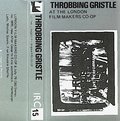 At The London Film Makers Co-Op
Throbbing Gristle
At The London Film Makers Co-Op
Throbbing Gristle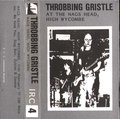 At The Nag's Head, High Wycombe
Throbbing Gristle
At The Nag's Head, High Wycombe
Throbbing Gristle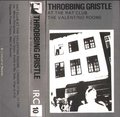 At The Rat Club The Valentino Rooms
Throbbing Gristle
At The Rat Club The Valentino Rooms
Throbbing Gristle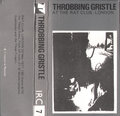 At The Rat Club, London
Throbbing Gristle
At The Rat Club, London
Throbbing Gristle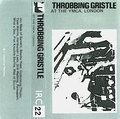 At The YMCA, London
Throbbing Gristle
At The YMCA, London
Throbbing Gristle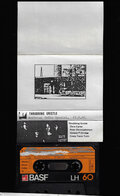 Austrian Radio Special
Throbbing Gristle
Austrian Radio Special
Throbbing Gristle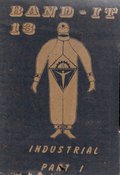 Band-It 13 Cassette Magazine
Various
Band-It 13 Cassette Magazine
Various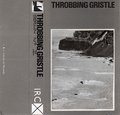 Berlin 2
Throbbing Gristle
Berlin 2
Throbbing GristleBest of Volume... I Throbbing Gristle
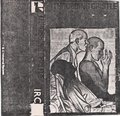 Best of Volume... I
Throbbing Gristle
Best of Volume... I
Throbbing Gristle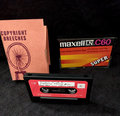 Best of Volume... I / The Best of Volume I
Throbbing Gristle
Best of Volume... I / The Best of Volume I
Throbbing Gristle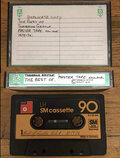 Best of Volume... I / The Best of Volume I
Throbbing Gristle
Best of Volume... I / The Best of Volume I
Throbbing Gristle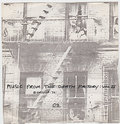 Best of Volume... II
Throbbing Gristle
Best of Volume... II
Throbbing Gristle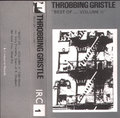 Best of Volume... II
Throbbing Gristle
Best of Volume... II
Throbbing Gristle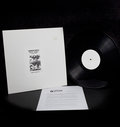 Best Of... Volume II
Throbbing Gristle
Best Of... Volume II
Throbbing GristleBeyond Jazz Funk TG Psychic Rally In Heaven - 23rd December 1980 London Throbbing Gristle
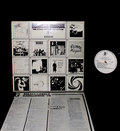 Business Unusual (The Other Record Collection)
Various
Business Unusual (The Other Record Collection)
Various Complex Sound Generation
Various
Complex Sound Generation
Various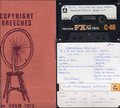 D.o.A. The Third And Final Report
Throbbing Gristle
D.o.A. The Third And Final Report
Throbbing Gristle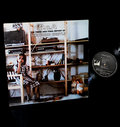 D.o.A. The Third And Final Report
Throbbing Gristle
D.o.A. The Third And Final Report
Throbbing Gristle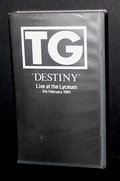 Destiny
Throbbing Gristle
Destiny
Throbbing Gristle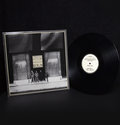 Discipline
Throbbing Gristle
Discipline
Throbbing Gristle Disposable Half-Truths
Richard H. Kirk
Disposable Half-Truths
Richard H. Kirk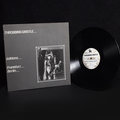 Editions Frankfurt-Berlin
Throbbing Gristle
Editions Frankfurt-Berlin
Throbbing Gristle Entwuerfe Zu Einem Ich ( Unanimous Anonymous Support )
Unanimous Anonymous
Erwachet!
Various
Entwuerfe Zu Einem Ich ( Unanimous Anonymous Support )
Unanimous Anonymous
Erwachet!
Various FFM 11-10-80
Throbbing Gristle
FFM 11-10-80
Throbbing Gristle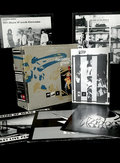 Five Albums
Throbbing Gristle
Five Albums
Throbbing Gristle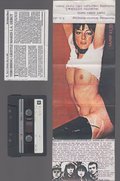 Foreplay - live Vets Auditorium
Throbbing Gristle
Foreplay - live Vets Auditorium
Throbbing Gristle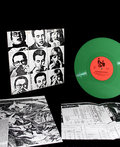 Führer Der Menschheit
Throbbing Gristle
Führer Der Menschheit
Throbbing Gristle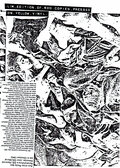 Führer der Menschheit
Throbbing Gristle
Führer der Menschheit
Throbbing Gristle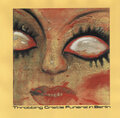 Funeral in Berlin
Throbbing Gristle
Funeral in Berlin
Throbbing Gristle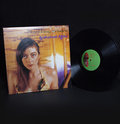 Greatest Hits - Entertainment Through Pain
Throbbing Gristle
Heathen Earth
Throbbing Gristle
Greatest Hits - Entertainment Through Pain
Throbbing Gristle
Heathen Earth
Throbbing Gristle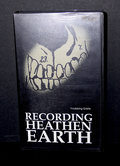 Heathen Earth
Throbbing Gristle
Heathen Earth
Throbbing Gristle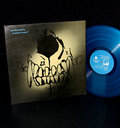 Heathen Earth
Throbbing Gristle
Heathen Earth
Throbbing Gristle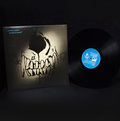 Heathen Earth
Throbbing Gristle
Heathen Earth
Throbbing Gristle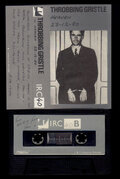 Heaven 23-12-1980
Throbbing Gristle
Heaven 23-12-1980
Throbbing Gristle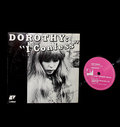 I Confess
Dorothy
I Confess
Dorothy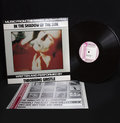 In The Shadow Of The Sun
Throbbing Gristle
In The Shadow Of The Sun
Throbbing Gristle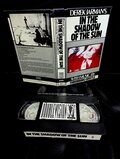 In the Shadow of the Sun (Soundtrack by Throbbing Gristle)
Derek Jarman
In the Shadow of the Sun (Soundtrack by Throbbing Gristle)
Derek Jarman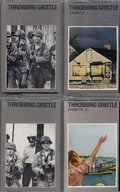 Interview A & B
Throbbing Gristle
Interview A & B
Throbbing Gristle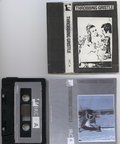 IRCA / IRC B Interview Tapes from 24 hour Box
Throbbing Gristle
IRCA / IRC B Interview Tapes from 24 hour Box
Throbbing GristleJJJ Interview Throbbing Gristle
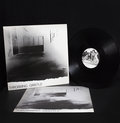 Journey Through A Body (signed Inner sleeve)
Throbbing Gristle
Journey Through A Body (signed Inner sleeve)
Throbbing Gristle Kezar Pavillon
Throbbing Gristle
Kezar Pavillon
Throbbing Gristle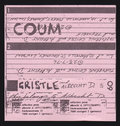 Live At 10, Martello St, Hackney, London
Throbbing Gristle With Albrecht D.
Live At 10, Martello St, Hackney, London
Throbbing Gristle With Albrecht D.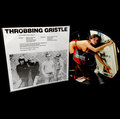 Live At Death Factory, May 79
Throbbing Gristle
Live At Death Factory, May 79
Throbbing Gristle Live at Factory Manchester 19-05-1979 (Assume Power Focus)
Throbbing Gristle
Live at Factory Manchester 19-05-1979 (Assume Power Focus)
Throbbing Gristle Live at Kezar Palace San Francisco (Mission Of Dead Souls – The Last Live Performance Of TG)
Throbbing Gristle
Live at Kezar Palace San Francisco (Mission Of Dead Souls – The Last Live Performance Of TG)
Throbbing GristleLive At Leeds Throbbing Gristle
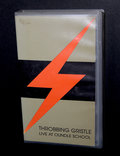 Live at Oundle School
Throbbing Gristle
Live at Oundle School
Throbbing Gristle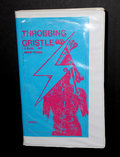 Live at Rafters Manchester
Throbbing Gristle
Live at Rafters Manchester
Throbbing Gristle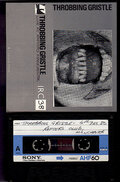 Live at Rafters Manchester 1981
Throbbing Gristle
Live at Rafters Manchester 1981
Throbbing Gristle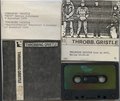 Live at SO36 and Frankfurt Kunsthofschule
Throbbing Gristle
Live at SO36 and Frankfurt Kunsthofschule
Throbbing GristleLive Berlin Number 2 Throbbing Gristle
 Live Death Factory Manchester 18 May 1979
Throbbing Gristle
Live Death Factory Manchester 18 May 1979
Throbbing Gristle Live FFM
Throbbing Gristle
Live FFM
Throbbing Gristle Live Frankfurt Kunsthofschule 11-10-1980
Throbbing Gristle
Live Frankfurt Kunsthofschule 11-10-1980
Throbbing Gristle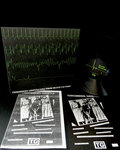 Live From Death Factory
Throbbing Gristle
Live From Death Factory
Throbbing Gristle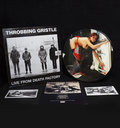 Live From The Death Factory
Throbbing Gristle
Live From The Death Factory
Throbbing GristleLive in Berlin 1 and 2 Throbbing Gristle
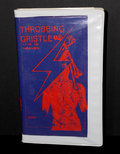 Live in Heaven
Throbbing Gristle
Live in Heaven
Throbbing Gristle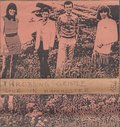 Live Manchester
Throbbing Gristle
Live Manchester
Throbbing Gristle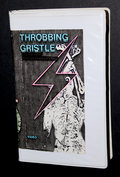 Making of Heathern Earth and Oundle School
Throbbing Gristle
Making of Heathern Earth and Oundle School
Throbbing Gristle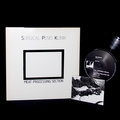 Meat Processing Section
S.P.K.
Mission Is Terminated / Nice Tracks (with Various Artists)
Throbbing Gristle
Mission of Dead Souls
Throbbing Gristle
Meat Processing Section
S.P.K.
Mission Is Terminated / Nice Tracks (with Various Artists)
Throbbing Gristle
Mission of Dead Souls
Throbbing Gristle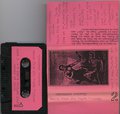 Music from the Death Factory
Throbbing Gristle
Music from the Death Factory
Throbbing Gristle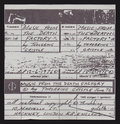 Music from the Death Factory 12 and 18.June 1976
Throbbing Gristle
Music from the Death Factory 12 and 18.June 1976
Throbbing Gristle Music, Noise, Sound & Beat
Various
Music, Noise, Sound & Beat
Various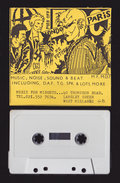 Music, Noise, Sound & Beat
Various
Music, Noise, Sound & Beat
Various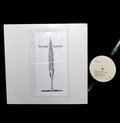 Nervous System
Various
Nervous System
Various New T.G. - live 76
Throbbing Gristle
New T.G. - live 76
Throbbing Gristle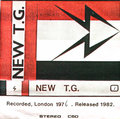 New T.G. 1 and 2
Throbbing Gristle
New T.G. 1 and 2
Throbbing Gristle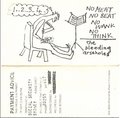 No Meat No Beat No Wank No Think Album, C60
Bleeding Arseholes
No Meat No Beat No Wank No Think Album, C60
Bleeding Arseholes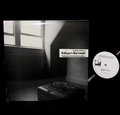 Nothing Here Now But The Recordings
William S. Burroughs
Nothing Short Of A Total War
Throbbing Gristle
Nothing Here Now But The Recordings
William S. Burroughs
Nothing Short Of A Total War
Throbbing Gristle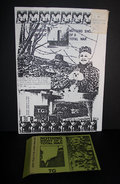 Nothing Short Of A Total War
Throbbing Gristle
Nothing Short Of A Total War
Throbbing Gristle Nothing Short Of A Total War
Throbbing Gristle
Nothing Short Of A Total War
Throbbing Gristle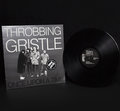 Once Upon A Time
Throbbing Gristle
Once Upon A Time
Throbbing Gristle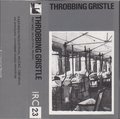 Pastimes / Industrial Muzac
Throbbing Gristle
Pastimes / Industrial Muzac
Throbbing Gristle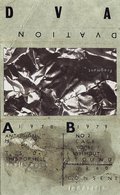 Promo-Tape 78-80
Clock DVA
Promo-Tape 78-80
Clock DVA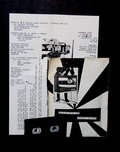 Qu'est-ce Qu'il Y A?
Various
Qu'est-ce Qu'il Y A?
Various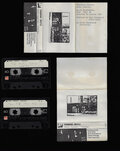 Radio Special - Alien Soundtracks
Throbbing Gristle
Radio Special - Alien Soundtracks
Throbbing Gristle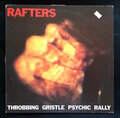 Rafters
Throbbing Gristle
Rafters
Throbbing Gristle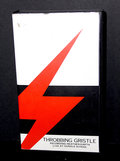 Recording Heathen Earth / Live At Oundle School
Throbbing Gristle
Recording Heathen Earth / Live At Oundle School
Throbbing Gristle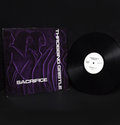 Sacrifice
Throbbing Gristle
Sacrifice
Throbbing Gristle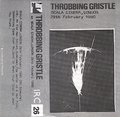 Scala Cinema, London 29th February 1980
Throbbing Gristle
Scala Cinema, London 29th February 1980
Throbbing Gristle Second Annual Report
Throbbing Gristle
Second Annual Report
Throbbing Gristle See Without Being Seen
Matt Johnson
See Without Being Seen
Matt Johnson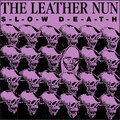 Slow Death
Leather Nun
Slow Death
Leather Nun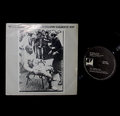 Slow Death
Leather Nun
Slow Death
Leather Nun SO36
Throbbing Gristle
SO36
Throbbing Gristle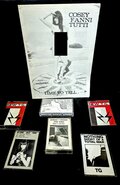 Some more TG Tapes not on Industrial Records (1982-1984)
Throbbing Gristle
Some more TG Tapes not on Industrial Records (1982-1984)
Throbbing Gristle some more Throbbing Gristle Releases 1979-1982 not on Industrial Records
Throbbing Gristle
some more Throbbing Gristle Releases 1979-1982 not on Industrial Records
Throbbing Gristle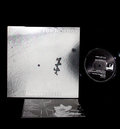 Something For Nobody
Monte Cazazza
Something For Nobody
Monte Cazazza Storm Bugs
Storm Bugs
Storm Bugs
Storm Bugs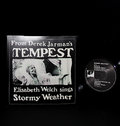 Stormy Weather
Elisabeth Welsh
Stormy Weather
Elisabeth Welsh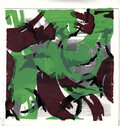 Subhuman / Something Came Over Me
Throbbing Gristle
Subhuman / Something Came Over Me
Throbbing Gristle The Art of Flight / Blood Bone Brain
Allen Fisher
The Art of Flight / Blood Bone Brain
Allen Fisher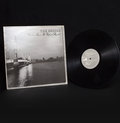 The Bridge
Thomas Leer / Robert Rental
The Bridge
Thomas Leer / Robert Rental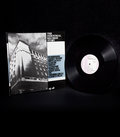 The Industrial Records Story
Various
The Industrial Records Story
Various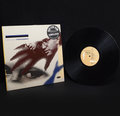 The Last Testament
Various
The Last Testament
Various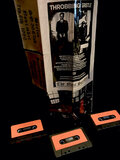 The Nazi Suicides
Throbbing Gristle
The Nazi Suicides
Throbbing Gristle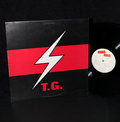 The Second Annual Report
Throbbing Gristle
The Second Annual Report
Throbbing Gristle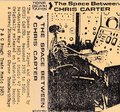 The Space Between
Chris Carter
The Space Between
Chris CarterThe Space Between Chris Carter
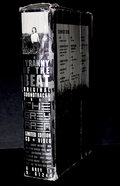 The Tyranny of the Beat
Various
The Tyranny of the Beat
Various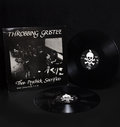 Thee Psychick Sacrifice
Throbbing Gristle
Thee Psychick Sacrifice
Throbbing Gristle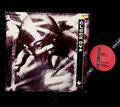 Thirst
Clock DVA
Thirst
Clock DVA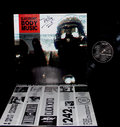 This Is Electronic Body Music
Various
This Is Electronic Body Music
Various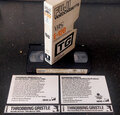 Three in One Video
Throbbing Gristle
Three in One Video
Throbbing Gristle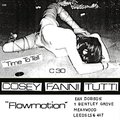 Time To Tell
Cosey Fanni Tutti
Time To Tell
Cosey Fanni Tutti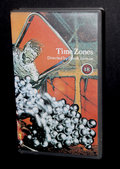 Time Zones
Throbbing Gristle / Derek Jarman
Time Zones
Throbbing Gristle / Derek Jarman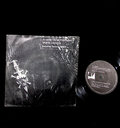 To Mom On Mother's Day
Monte Cazazza
To Mom On Mother's Day
Monte Cazazza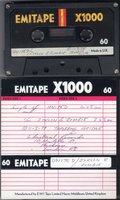 United (Master-Tape)
Throbbing Gristle
United (Master-Tape)
Throbbing Gristle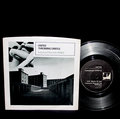 United / Zyklon B Zombie
Throbbing Gristle
United / Zyklon B Zombie
Throbbing Gristle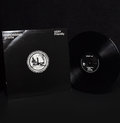 Very Friendly
Throbbing Gristle
Very Friendly
Throbbing Gristle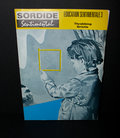 We Hate You (Little Girls) / Five Knuckle Shuffle
Throbbing Gristle
We Hate You (Little Girls) / Five Knuckle Shuffle
Throbbing Gristle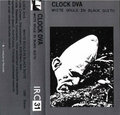 White Souls In Black Suits
Clock DVA
White Souls In Black Suits
Clock DVA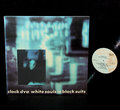 White Souls In Black Suits
Clock DVA
White Souls In Black Suits
Clock DVARelated Artists & Bands
Albrecht/dAviador DroChris and CoseyChris CarterCoilCoum TransmissionsPeter ChristophersonPsychic TVSalò MentaleSkot ArmstThe Death & Beauty FoundationThe Door and The WindowThird Door From The LeftThrobbing GristleThrobbing Gristle & Genesis P-OrridgeThrobbing Gristle / Derek JarmanThrobbing Gristle With Albrecht D.Vagina Dentata OrganVal DenhamWilliam S. BurroughsZone (GB)Related Artists & Bands Literature
 "Forgive us our Synth" article in Sounds 1981
Throbbing Gristle
"Forgive us our Synth" article in Sounds 1981
Throbbing Gristle "Scenes of Victory" Antwerpen 1978
Coum Transmissions
"Scenes of Victory" Antwerpen 1978
Coum Transmissions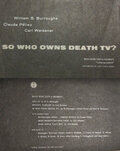 "So Who Owns Death TV?" William S. Burroughs, Claude Pelieu, and Carl Weissner.
William S. Burroughs
"So Who Owns Death TV?" William S. Burroughs, Claude Pelieu, and Carl Weissner.
William S. Burroughs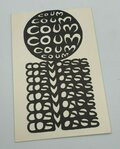 'Cosmosis' COUM Transmissions mail art postcard
Coum Transmissions
'Cosmosis' COUM Transmissions mail art postcard
Coum Transmissions 1001 Ways to Coum
Coum Transmissions
1001 Ways to Coum
Coum Transmissions 11. Three A4 Flyers, two from 1989 and 1990, each signed by GP-O. Some creasing to corners. And stain to ‘Abolish Fear Establish Trust’.
Psychic TV
11. Three A4 Flyers, two from 1989 and 1990, each signed by GP-O. Some creasing to corners. And stain to ‘Abolish Fear Establish Trust’.
Psychic TV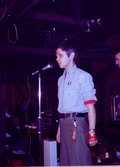 16 Photos by Peter Bargh Throbbing Gristle live at Rafters 4 December 1980
Throbbing Gristle
16 Photos by Peter Bargh Throbbing Gristle live at Rafters 4 December 1980
Throbbing Gristle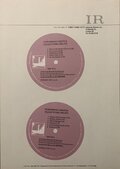 20 Jazz Funk Center Label Proof Sheet
Throbbing Gristle
20 Jazz Funk Center Label Proof Sheet
Throbbing Gristle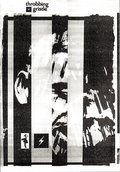 28p Booklet to Fetish 5Lp-Set
Throbbing Gristle
28p Booklet to Fetish 5Lp-Set
Throbbing Gristle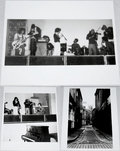 3 x early COUM photos, 1970, 2 of group, one of Dagger Lane (annotated ‘Alien Brain Hull’), Hull (copies made ca. 1995 by GP-O) 10 x 8 inches. [Wreckers 1.21]
Coum Transmissions
3 x early COUM photos, 1970, 2 of group, one of Dagger Lane (annotated ‘Alien Brain Hull’), Hull (copies made ca. 1995 by GP-O) 10 x 8 inches. [Wreckers 1.21]
Coum Transmissions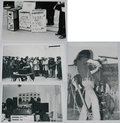 4 x photos relating to ‘Prostitution’, ICA, 1976, each ca. 14 x 9 cm, signed on verso and reprinted by Paul Buck ca. 1995 [Wreckers 6.28-29]
Coum Transmissions
4 x photos relating to ‘Prostitution’, ICA, 1976, each ca. 14 x 9 cm, signed on verso and reprinted by Paul Buck ca. 1995 [Wreckers 6.28-29]
Coum Transmissions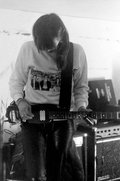 44 Live and Studio Photos taken by Kevin Thorne of We Be Echo
Throbbing Gristle
44 Live and Studio Photos taken by Kevin Thorne of We Be Echo
Throbbing Gristle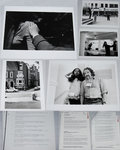 5 x black and white photographs 1973 (21.5 x 16.5 cm) by David Mayor,
Coum Transmissions
5 x black and white photographs 1973 (21.5 x 16.5 cm) by David Mayor,
Coum Transmissions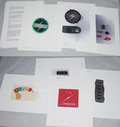 7 colour photocopies all signed and with two pages of notes explaining context and significance
Throbbing Gristle
7 colour photocopies all signed and with two pages of notes explaining context and significance
Throbbing Gristle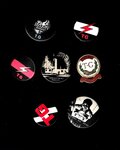 7 x TG Pins
Throbbing Gristle
7 x TG Pins
Throbbing Gristle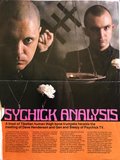 80s press clippings
Psychic TV
80s press clippings
Psychic TV A Personal Message from the Temple
Psychic TV
A Personal Message from the Temple
Psychic TV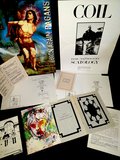 a selection of Inserts and Posters
Coil
a selection of Inserts and Posters
Coil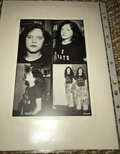 a selection of Postcards
Coum Transmissions
a selection of Postcards
Coum TransmissionsA4 flyer TG and Bauhaus at The Guildhall Northampton, 26 May 1979 Throbbing Gristle
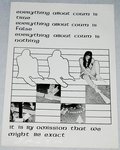 A4 Sheet "everything about coum is true"
Coum Transmissions
A4 Sheet "everything about coum is true"
Coum Transmissions A5 Flyer for Hammersmith with A Certain Ratio
Psychic TV
A5 Flyer for Hammersmith with A Certain Ratio
Psychic TV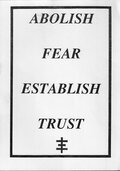 Abolish Fear Establish Trust A4 Sheet
Psychic TV
Abolish Fear Establish Trust A4 Sheet
Psychic TV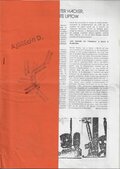 Abvertising Expenses
Albrecht/d
Abvertising Expenses
Albrecht/d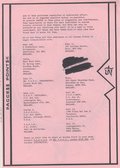 Access Points and Adresses from 1988
Psychic TV
Access Points and Adresses from 1988
Psychic TV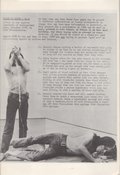 Action at the Los Angeles Institute for Contemporary Arts, November 1976 (in Curtains Magazin Le Prochaine Step)
Coum Transmissions
Action at the Los Angeles Institute for Contemporary Arts, November 1976 (in Curtains Magazin Le Prochaine Step)
Coum Transmissions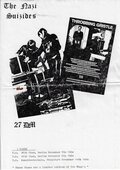 add for Nazi Suicide Tape
Throbbing Gristle
add for Nazi Suicide Tape
Throbbing Gristle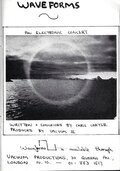 Add for Waveforms in Groupvine 13
Chris Carter
Add for Waveforms in Groupvine 13
Chris Carter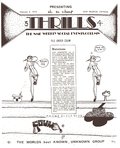 Add in New Musical Express 1974
Coum Transmissions
Add in New Musical Express 1974
Coum Transmissions Al Ackermans Arthur Turner Booklet
Throbbing Gristle
Al Ackermans Arthur Turner Booklet
Throbbing Gristle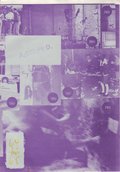 Albrecht D / Reflection Press Info-Map
Albrecht/d
Albrecht D / Reflection Press Info-Map
Albrecht/d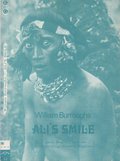 Ali's Smile (Expanded Media Editions E.M.C.12)
William S. Burroughs
Ali's Smile (Expanded Media Editions E.M.C.12)
William S. Burroughs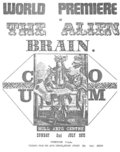 Alien Brain Poster
Coum Transmissions
Alien Brain Poster
Coum Transmissions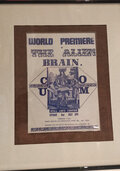 Alien Brains Poster
Coum Transmissions
Alien Brains Poster
Coum Transmissions Allegory & Self Promo Poster
Psychic TV
Allegory & Self Promo Poster
Psychic TV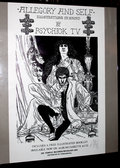 Allegory and Self Promo-Poster
Psychic TV
Allegory and Self Promo-Poster
Psychic TV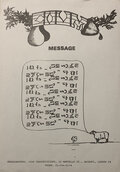 Alphabet Message xerox print
Coum Transmissions
Alphabet Message xerox print
Coum Transmissions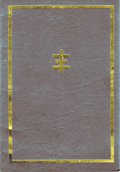 An Introduction to the Temple of Psychic Youth
Psychic TV
An Introduction to the Temple of Psychic Youth
Psychic TV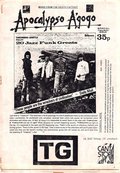 Apocalypse A Gogo
Throbbing Gristle
Apocalypse A Gogo
Throbbing Gristle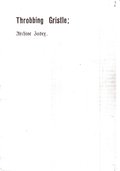 Archive Index by David Minshall (Scans by Simon Dell)
Throbbing Gristle
Archive Index by David Minshall (Scans by Simon Dell)
Throbbing Gristle ARTE INGLESE OGGI 1960-1976, Electa, Milano 1976.
Coum Transmissions
ARTE INGLESE OGGI 1960-1976, Electa, Milano 1976.
Coum Transmissions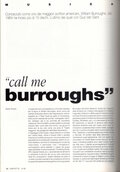 Article by Walter ROvere in Contatto
William S. Burroughs
Article by Walter ROvere in Contatto
William S. Burroughs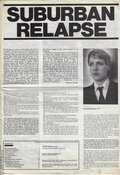 Article called "Suburban Relapse" by Genesis P-Orridge on Val Denham
Val Denham
Article called "Suburban Relapse" by Genesis P-Orridge on Val Denham
Val Denham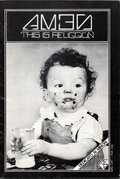 Article in Amen 5
Coil
Article in Amen 5
Coil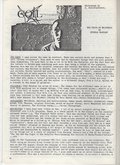 Article in Grok
Coil
Article in Grok
Coil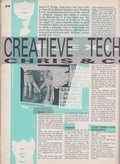 Article in June 82 VINYL No.15
Chris and Cosey
Article in June 82 VINYL No.15
Chris and Cosey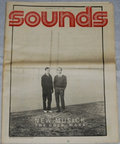 Article in Sounds 26 November 1977
Throbbing Gristle
Article in Sounds 26 November 1977
Throbbing Gristle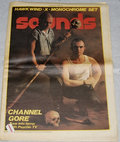 Article in Sounds 6 November 1982
Psychic TV
Article in Sounds 6 November 1982
Psychic TV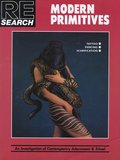 Articles in Modern Primitives (Re/Search)
Psychic TV
Articles in Modern Primitives (Re/Search)
Psychic TV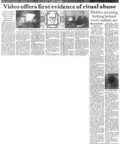 Articles to the ABUSE Case in 1992 provided by Akiko ada who was 21 at the time and not 13 as Gen was accused for
Psychic TV
Articles to the ABUSE Case in 1992 provided by Akiko ada who was 21 at the time and not 13 as Gen was accused for
Psychic TV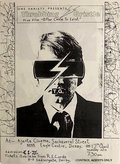 at Ajanta Cinema, Flyer, designed by Val Denham
Throbbing Gristle
at Ajanta Cinema, Flyer, designed by Val Denham
Throbbing Gristle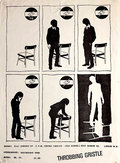 at Centro Iberico
Throbbing Gristle
at Centro Iberico
Throbbing Gristle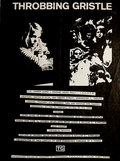 at Rafters Poster
Throbbing Gristle
at Rafters Poster
Throbbing Gristle at Sheffield Poster April 1979
Throbbing Gristle
at Sheffield Poster June 1980 (with Cabaret Voltaire)
Throbbing Gristle
at Sheffield Poster April 1979
Throbbing Gristle
at Sheffield Poster June 1980 (with Cabaret Voltaire)
Throbbing Gristle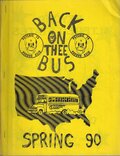 Back on Thee Buss Spring 1990
Psychic TV
Back on Thee Buss Spring 1990
Psychic TV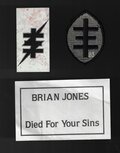 badge and two stickers
Psychic TV
badge and two stickers
Psychic TV Bandphoto
Throbbing Gristle
Bandphoto
Throbbing Gristle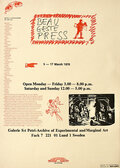 Beau Geste Press Exhibition Poster incl Coum Transmissions
Coum Transmissions
Beau Geste Press Exhibition Poster incl Coum Transmissions
Coum Transmissions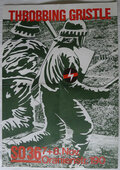 Berlin SO36 Concert Poster
Throbbing Gristle
Berlin SO36 Concert Poster
Throbbing Gristle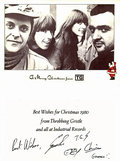 Best wishes for X-Mas 1980 Postcard
Throbbing Gristle
Best wishes for X-Mas 1980 Postcard
Throbbing Gristle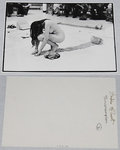 Black and White photograph of Cosey Fanni Tutti in Studio of Lust, Nuffield Gallery, Southampton,
Coum Transmissions
Black and White photograph of Cosey Fanni Tutti in Studio of Lust, Nuffield Gallery, Southampton,
Coum Transmissions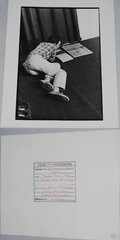 Black and white photograph of Peter Christopherson
Coum Transmissions
Black and white photograph of Peter Christopherson
Coum Transmissions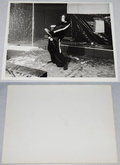 Black and white photograph. COUMing of Age
Coum Transmissions
Black and white photograph. COUMing of Age
Coum Transmissions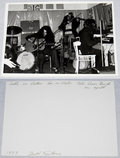 Black and white photograph. Live 1973
Coum Transmissions
Black and white photograph. Live 1973
Coum Transmissions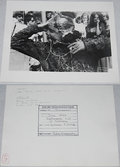 Black and white photograph. Omissions
Coum Transmissions
Black and white photograph. Omissions
Coum Transmissions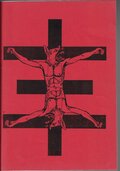 Booklet red
Psychic TV
Booklet red
Psychic TV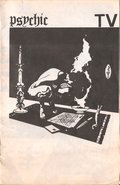 Booklet to Inner-X Interview Tape-Release
Psychic TV
Booklet to Inner-X Interview Tape-Release
Psychic TV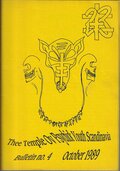 Bulleti Scandinavia No.4
Psychic TV
Bulleti Scandinavia No.4
Psychic TV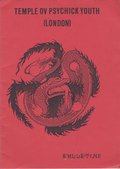 Bulletin 2
Psychic TV
Bulletin 2
Psychic TV Can you fix us up with a gig postcard
Throbbing Gristle
Cast Metal Phallus "Force the Hands of Chance"
Psychic TV
Can you fix us up with a gig postcard
Throbbing Gristle
Cast Metal Phallus "Force the Hands of Chance"
Psychic TV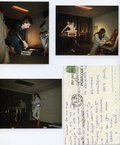 Chris & Cosey Live Loft 1981 Berlin Photos
Chris and Cosey
Chris & Cosey Live Loft 1981 Berlin Photos
Chris and Cosey Chris & Cosey Postcards
Chris and Cosey
Chris & Cosey Postcards
Chris and Cosey Chris and Cosey Compliments slip from Cosey 1992
Chris and Cosey
Chris and Cosey Compliments slip from Cosey 1992
Chris and Cosey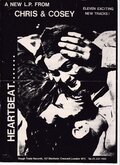 Chris and Cosey Heartbeat album flyer 1981
Chris and Cosey
Chris and Cosey Heartbeat album flyer 1981
Chris and Cosey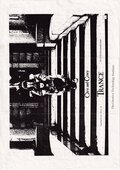 Chris and Cosey Trance flyer and news update 1982
Chris and Cosey
Chris and Cosey Trance flyer and news update 1982
Chris and Cosey Chris and Cosey Twist & In Continuum Postcards
Chris and Cosey
Chris and Cosey Twist & In Continuum Postcards
Chris and Cosey Christmas Card
Throbbing Gristle
Christmas Card
Throbbing Gristle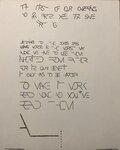 Coded Note Xerox Flyer
Coum Transmissions
Coded Note Xerox Flyer
Coum Transmissions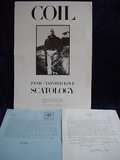 Coil early promoletters and letters to Graf Haufen
Coil
Coil early promoletters and letters to Graf Haufen
Coil Coil in Acide Sedativ No.1 (1985)
Coil
Coil in Acide Sedativ No.1 (1985)
Coil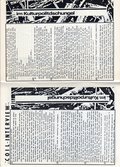 Coil in ADN Number 7
Coil
Coil in ADN Number 7
Coil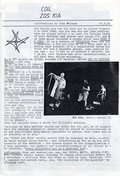 Coil in Feverish
Coil
Coil in Feverish
Coil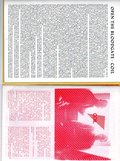 Coil in Hahahaha they are coming to take us away - Open the Bloodgate
Coil
Coil in Hahahaha they are coming to take us away - Open the Bloodgate
Coil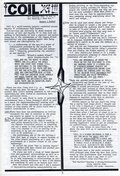 Coil in Interchange Mag
Coil
Coil in Minotaurus 2
Coil
Coil in nekrophile Booklet
Coil
Coil in Interchange Mag
Coil
Coil in Minotaurus 2
Coil
Coil in nekrophile Booklet
Coil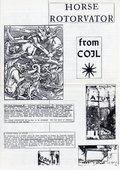 Coil in Rattlesnake 3
Coil
Coil in Rattlesnake 3
Coil Coil in Tape Delay
Coil
Coil in Tape Delay
Coil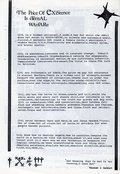 Coil in Toxoplasma
Coil
Coil Photo Zürich 2002
Coil
Coil in Toxoplasma
Coil
Coil Photo Zürich 2002
Coil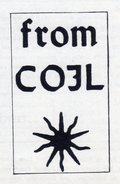 Coil Sun
Coil
Coil vs. ElpH Poster
Coil
Coil Sun
Coil
Coil vs. ElpH Poster
CoilColour photocopy of original TG flash by Cosey Fanni Tutti signed by G-PO and blind stamped ‘P-Orridge with Everything Limited’. Ca. 1995. 207 x 279 mm Throbbing Gristle
 Colour photograph of GP-O recording ‘Journey Through a Body’ in Rome. Inscribed on verso by GP-O. 131 x 88 mm
Throbbing Gristle
Colour photograph of GP-O recording ‘Journey Through a Body’ in Rome. Inscribed on verso by GP-O. 131 x 88 mm
Throbbing Gristle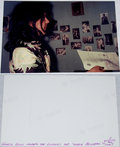 Colour photograph probably a mid-1990s reprint. ‘
Coum Transmissions
Colour photograph probably a mid-1990s reprint. ‘
Coum Transmissions Compliments slip 1981
Throbbing Gristle
concert poster with Throbbing Gristle
Cabaret Voltaire
Compliments slip 1981
Throbbing Gristle
concert poster with Throbbing Gristle
Cabaret Voltaire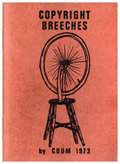 Copyright Breeches (Beau Geste Press)
Coum Transmissions
Copyright Breeches (Beau Geste Press)
Coum Transmissions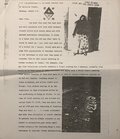 Copyright Breeches Letter
Coum Transmissions
Copyright Breeches Letter
Coum Transmissions Copyright Breeches Postcard Ted Glass (Reflection Press)
Coum Transmissions
Copyright Breeches Postcard Ted Glass (Reflection Press)
Coum Transmissions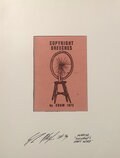 Copyright Breeches Print signed and stamped
Coum Transmissions
Copyright Breeches Print signed and stamped
Coum Transmissions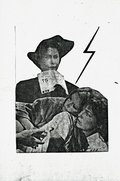 Cosey COllage and letter
Throbbing Gristle
Cosey COllage and letter
Throbbing Gristle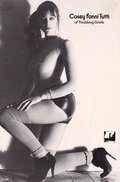 Cosey Fanni Tutti Personality Card 1981
Throbbing Gristle
Cosey Fanni Tutti Personality Card 1981
Throbbing Gristle Cosey Funni Tutti Card/Poster
Throbbing Gristle
Cosey Funni Tutti Card/Poster
Throbbing Gristle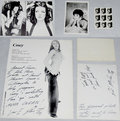 Cosey publicity card ca. 1976, 209 x 148 mm. [Wreckers 6.25] with Alma Cogan stamps and publicity card, both inscribed and signed by GP-O explaining the connections.
Coum Transmissions
Cosey publicity card ca. 1976, 209 x 148 mm. [Wreckers 6.25] with Alma Cogan stamps and publicity card, both inscribed and signed by GP-O explaining the connections.
Coum Transmissions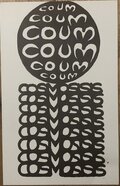 Cosmosis postcard
Coum Transmissions
Cosmosis postcard
Coum Transmissions COUM 'business' card, c. 1971.
Coum Transmissions
COUM 'business' card, c. 1971.
Coum Transmissions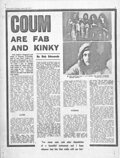 Coum are Fab and Kinky in Torchlight 1971
Coum Transmissions
Coum are Fab and Kinky in Torchlight 1971
Coum Transmissions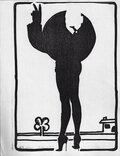 Coum Collage 1974
Coum Transmissions
Coum Collage 1974
Coum Transmissions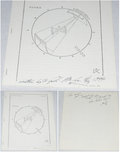 COUM Decoumposition ‘Schlimm’. 1974. 15 leaves, stapled binding.
Coum Transmissions
COUM Decoumposition ‘Schlimm’. 1974. 15 leaves, stapled binding.
Coum Transmissions Coum Fly with me
Coum Transmissions
Coum Fly with me
Coum Transmissions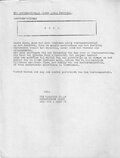 Coum in MIXED MEDIA 6
Coum Transmissions
Coum in MIXED MEDIA 6
Coum Transmissions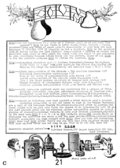 Coum Introduction Sheet
Coum Transmissions
Coum Introduction Sheet
Coum Transmissions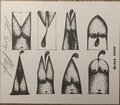 Coum Penis Postcard signed and stamped by Gen
Coum Transmissions
Coum Penis Postcard signed and stamped by Gen
Coum Transmissions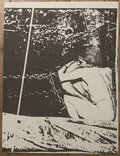 Coum Postcard Paranoia Club 1975 (Reflection press)
Coum Transmissions
Coum Postcard Paranoia Club 1975 (Reflection press)
Coum Transmissions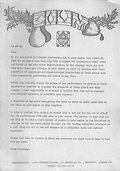 Coum Promo April 1975
Coum Transmissions
Coum Promo April 1975
Coum Transmissions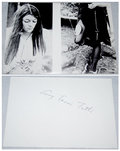 COUM publicity card
Coum Transmissions
COUM publicity card
Coum Transmissions COUM publicity card
Coum Transmissions
COUM publicity card
Coum Transmissions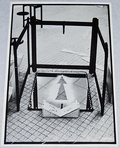 COUM publicity card showing Aalst arrows and mirror sculpture. 1975.
Coum Transmissions
COUM publicity card showing Aalst arrows and mirror sculpture. 1975.
Coum Transmissions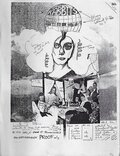 Coum Rabbits (Gen)
Coum Transmissions
Coum Rabbits (Gen)
Coum Transmissions Coum Stickers
Coum Transmissions
Coum Stickers
Coum Transmissions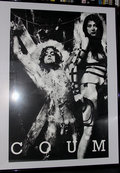 Coum Transmissions
Coum Transmissions
Coum Transmissions
Coum Transmissions Coum Transmissions "Scenes of Victory" 5-5-1978 Antwerpen
Coum Transmissions
Coum Transmissions "Scenes of Victory" 5-5-1978 Antwerpen
Coum TransmissionsCoum Transmissions Exhibition 2017 - Photos by Amy Chiros Coum Transmissions
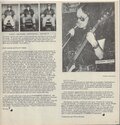 Coum Transmissions in Virus Vernal 1977
Coum Transmissions
Coum Transmissions in Virus Vernal 1977
Coum Transmissions Coum Transmissions Rectum As Inner Space Postcard as part of the Image Bank Post Card Show Box-Set
Coum Transmissions
Coum Transmissions Rectum As Inner Space Postcard as part of the Image Bank Post Card Show Box-Set
Coum Transmissions Coum Transmissions Works Overview (in Intermedia 1) Status 1974
Coum Transmissions
Coum Transmissions Works Overview (in Intermedia 1) Status 1974
Coum Transmissions COUM with Monte Cazazza Envelope with 3 small colour prints
Coum Transmissions
COUM with Monte Cazazza Envelope with 3 small colour prints
Coum Transmissions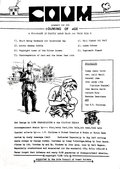 Couming of Age
Coum Transmissions
Couming of Age
Coum Transmissions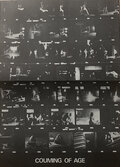 Couming of Age Poster
Coum Transmissions
Couming of Age Poster
Coum Transmissions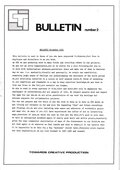 CTI Bulletin 2 (November 1982)
Chris and Cosey
CTI Bulletin 2 (November 1982)
Chris and Cosey CTI Bulletin 3
Chris and Cosey
CTI Bulletin 3
Chris and Cosey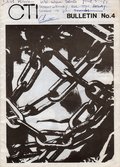 CTI Bulletin 4
Chris and Cosey
CTI Bulletin 4
Chris and Cosey CTI Bulletin 5
Chris and Cosey
CTI Bulletin 5
Chris and Cosey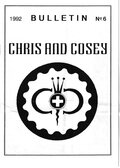 CTI Bulletin 6
Chris and Cosey
CTI Bulletin 6
Chris and Cosey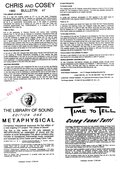 CTI Bulletin 7
Chris and Cosey
CTI Bulletin 7
Chris and Cosey CTI Mailorder 1982
Chris and Cosey
CTI Mailorder 1982
Chris and Cosey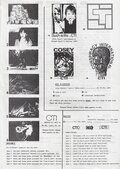 CTI Mailorder 1984
Chris and Cosey
CTI Mailorder 1984
Chris and Cosey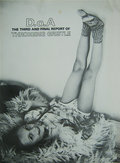 D.O.A. the Third and Final Report Poster
Throbbing Gristle
D.O.A. the Third and Final Report Poster
Throbbing Gristle Dead City Radio
William S. Burroughs
Dead City Radio
William S. Burroughs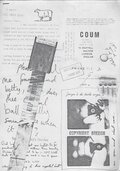 Dearset Frank
Coum Transmissions
Different early Manifests
Coil
Dearset Frank
Coum Transmissions
Different early Manifests
Coil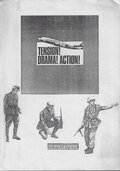 Drama Action
Coum Transmissions
Drama Action
Coum Transmissions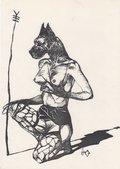 Drawings by James Eden alias Jym Eden
Psychic TV
Drawings by James Eden alias Jym Eden
Psychic TV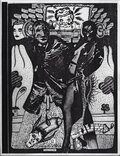 early Collage
Coum Transmissions
early Collage
Coum Transmissions Early COUM’ envelope containing 5 photocopies : a collage ; a page from a 1969 diary ; a 1969 flyer ; ‘mission is terminated’ letter ; portrait in beret 1973.
Coum Transmissions
Early COUM’ envelope containing 5 photocopies : a collage ; a page from a 1969 diary ; a 1969 flyer ; ‘mission is terminated’ letter ; portrait in beret 1973.
Coum Transmissions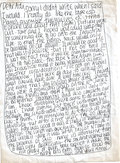 early letters by John Balance
Coil
early Manifests
Coil
early letters by John Balance
Coil
early Manifests
Coil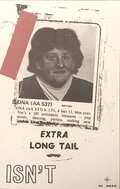 Edna Postcard
Coum Transmissions
Edna Postcard
Coum Transmissions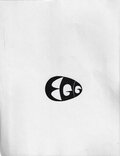 Egg
Coum Transmissions
Egg
Coum Transmissions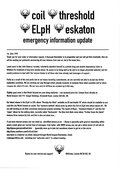 Emergency Information Update 1995
Coil
Emergency Information Update 1995
Coil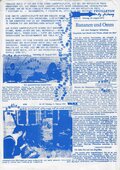 Endless Music Promo / Review Sheet
Albrecht/d
Endless Music Promo / Review Sheet
Albrecht/d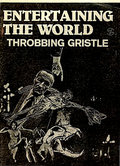 Entertaining the World Booklet
Throbbing Gristle
Entertaining the World Booklet
Throbbing Gristle essential related Literature
Throbbing Gristle
essential related Literature
Throbbing Gristle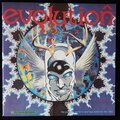 EVOLUTION - The Psychic surfers newage bible for the 90s Encyclopaedia Psychedelica volume 13 & 14
Psychic TV
EVOLUTION - The Psychic surfers newage bible for the 90s Encyclopaedia Psychedelica volume 13 & 14
Psychic TV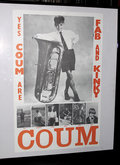 Fab and Kinky
Coum Transmissions
Fab and Kinky
Coum Transmissions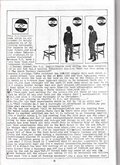 Fanzine Articles selected
Throbbing Gristle
Fanzine Articles selected
Throbbing Gristle File Postcard
Coum Transmissions
File Postcard
Coum Transmissions Final Solution Present a night with Industrial Records ... Monte Cazazza, The Leather Nun and Throbbing Gristle. 29 February 1980.
Throbbing Gristle
Final Solution Present a night with Industrial Records ... Monte Cazazza, The Leather Nun and Throbbing Gristle. 29 February 1980.
Throbbing GristleFinal Solution Present a Psychic Youth Rally Throbbing Gristle, A Certain Ratio & S.P.K. (Surgical Penis Klinik) in Heaven, 23 December 1980. Throbbing Gristle
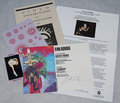 Five pieces of Ephemera.
Psychic TV
Five pieces of Ephemera.
Psychic TV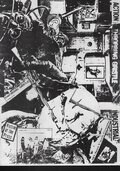 Flyer "Victim of the Press"
Throbbing Gristle
Flyer "Victim of the Press"
Throbbing Gristle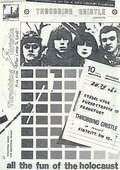 Flyer 1980.11.10 Frankfurt Städel
Throbbing Gristle
Flyer 1980.11.10 Frankfurt Städel
Throbbing Gristleflyer announcing a performance by Throbbing Gristle at the London Film-Makers' Co-op, London, 6th July (1978). Throbbing Gristle
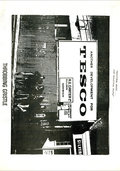 Flyer Another Development for Tesco
Throbbing Gristle
Flyer Another Development for Tesco
Throbbing Gristle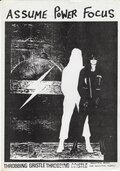 Flyer Assume Power Focus
Throbbing Gristle
Flyer Assume Power Focus
Throbbing Gristle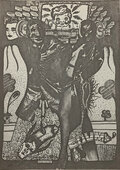 Flyer COllage signed
Coum Transmissions
Flyer COllage signed
Coum Transmissions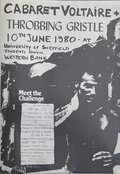 Flyer for 10th June 1980 Sheffiedl University (with Cabaret Voltaire)
Throbbing Gristle
Flyer for 10th June 1980 Sheffiedl University (with Cabaret Voltaire)
Throbbing Gristle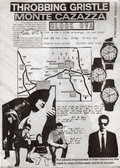 Flyer for F-Club Concert with Cazazza and Clock DVA
Throbbing Gristle
Flyer for F-Club Concert with Cazazza and Clock DVA
Throbbing GristleFlyer for Final Solution Present ... four nights at the Prince of Wales Conference Centre 1979, including Joy Division, Clock DVA, Cabaret Voltaire and Throbbing Gristle. Throbbing Gristle
 Flyer for Final Soultion Concert 7. April 1979 / The Institute for Continuing education
Throbbing Gristle
Flyer for Final Soultion Concert 7. April 1979 / The Institute for Continuing education
Throbbing Gristle Flyer for Heaven 23rd December with Monte Cazazza
Psychic TV
Flyer for Heaven 23rd December with Monte Cazazza
Psychic TV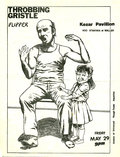 Flyer for Live Kezar Pavillion May 29th
Throbbing Gristle
Flyer for Live Kezar Pavillion May 29th
Throbbing GristleFlyer for TG at YMCA 3rd August 1979 designed by Val Denham. (see Wreckers 9.7.) Throbbing Gristle
Flyer for Throbbing Gristle at Centro Iberico 21st January 1979 designed by Val Denham 297 x 210 mm. Throbbing Gristle
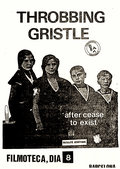 Flyer for Throbbing Gristle's "After Cease To Exist" film presentation
Throbbing Gristle
Flyer for Throbbing Gristle's "After Cease To Exist" film presentation
Throbbing Gristle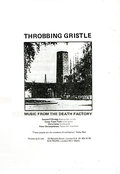 Flyer Music from the Death Factory
Throbbing Gristle
Flyer Music from the Death Factory
Throbbing Gristle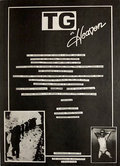 Flyer Psychic Ralley in Heaven
Throbbing Gristle
Flyer Psychic Ralley in Heaven
Throbbing Gristle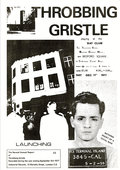 Flyer Rat Club 17th December 1977
Throbbing Gristle
Flyer Rat Club 17th December 1977
Throbbing Gristle Flyer The Institute of Continuing Education / Final Solution 7 April 1979
Throbbing Gristle
Flyer The Institute of Continuing Education / Final Solution 7 April 1979
Throbbing Gristle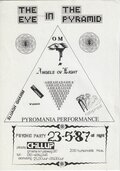 Flyer Thee Eye in thee Pyramid
Psychic TV
Flyer Thee Eye in thee Pyramid
Psychic TV Flyer to "Prostitution" Exhibition-Concert at ICA 1976
Coum Transmissions
Flyer to Show
Coum Transmissions
Flyer to "Prostitution" Exhibition-Concert at ICA 1976
Coum Transmissions
Flyer to Show
Coum Transmissions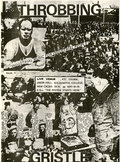 Flyer Union Hall 1978
Throbbing Gristle
Flyer Union Hall 1978
Throbbing Gristle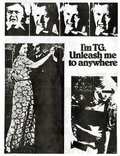 Flyer Unleash me to Everywhere
Throbbing Gristle
Flyer Unleash me to Everywhere
Throbbing Gristle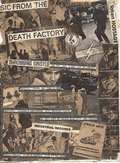 Flyer Vets Auditorium Los Angeles, May 22nd, 1981
Throbbing Gristle
Flyer Vets Auditorium Los Angeles, May 22nd, 1981
Throbbing Gristle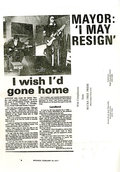 Flyer, Mayor, I may resign
Throbbing Gristle
Flyer, Mayor, I may resign
Throbbing Gristle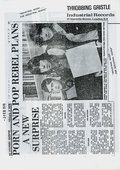 Flyer: Hackney Gazette Press
Throbbing Gristle
for Equinox Event
Coil
Flyer: Hackney Gazette Press
Throbbing Gristle
for Equinox Event
Coil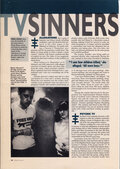 Fortean Times (No. 64, August-September 1992)
Psychic TV
Fortean Times (No. 64, August-September 1992)
Psychic TV Foxtrott Echo Archive Photos
Coum Transmissions
Foxtrott Echo Archive Photos
Coum Transmissions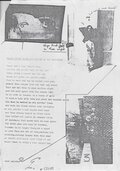 Frank Wanks
Coum Transmissions
Frank Wanks
Coum Transmissions Frankfurt Poster
Throbbing Gristle
Frankfurt Poster
Throbbing Gristle Frankfurt Poster
Throbbing Gristle
Frankfurt Poster
Throbbing Gristle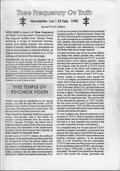 Frequency of Truth Newsletters
Psychic TV
Frequency of Truth Newsletters
Psychic TV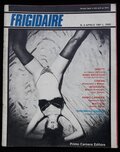 FRIGIDAIRE No. 6, April 1981, Primo Carnera publishing, Roma, Italy,
Throbbing Gristle
FRIGIDAIRE No. 6, April 1981, Primo Carnera publishing, Roma, Italy,
Throbbing Gristle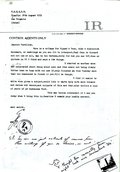 From the Desk of Genesis P-Orridge Letter (Industrial Records) in Ripped & Torn 18
Throbbing Gristle & Genesis P-Orridge
From the Desk of Genesis P-Orridge Letter (Industrial Records) in Ripped & Torn 18
Throbbing Gristle & Genesis P-Orridge Funeral in Berlin Inserts to 10inch release
Throbbing Gristle
Funeral in Berlin Inserts to 10inch release
Throbbing Gristle Galeria Akkumulatory Exhibition Postcard
Coum Transmissions
Galeria Akkumulatory Exhibition Postcard
Coum Transmissions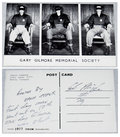 GARY GILMORE MEMORIAL SOCIETY Post Card
Coum Transmissions
GARY GILMORE MEMORIAL SOCIETY Post Card
Coum Transmissions Gary Gilmore Memorial Society T-Shirt
Throbbing Gristle
Gary Gilmore Memorial Society T-Shirt
Throbbing Gristle Gen and Cosey in National Press Porn Mag
Throbbing Gristle
Gen and Cosey in National Press Porn Mag
Throbbing Gristle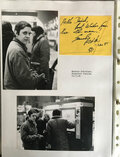 Gen at Frankfurt Train Station 1980
Throbbing Gristle
Gen Photo 1975
Coum Transmissions
Gen at Frankfurt Train Station 1980
Throbbing Gristle
Gen Photo 1975
Coum Transmissions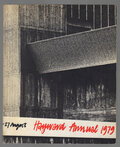 Genesis P-Orridge and Throbbing Gristle in Hayward Annual 1979
Throbbing Gristle
Genesis P-Orridge and Throbbing Gristle in Hayward Annual 1979
Throbbing Gristle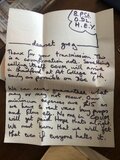 Genesis P-Orridge Letters in Foxtrott Echo Archive
Coum Transmissions
Genesis P-Orridge Letters in Foxtrott Echo Archive
Coum Transmissions Genesis P-Orridge Omissions, Kiel, publicity card
Coum Transmissions
Genesis P-Orridge Omissions, Kiel, publicity card
Coum Transmissions Genesis P-Orridge selected art and photos in Foxtrott Echo Archive
Coum Transmissions
Genesis P-Orridge selected art and photos in Foxtrott Echo Archive
Coum Transmissions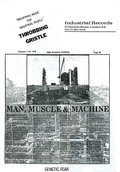 Genetic Fear Flyer Industrial Music for Industrial People
Throbbing Gristle
Genetic Fear Flyer Industrial Music for Industrial People
Throbbing Gristle Genetic Fear Xerox original
Throbbing Gristle
Genetic Fear Xerox original
Throbbing Gristle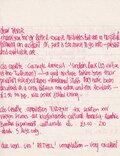 Geoff Rushton Letter from 1981 about his releases
Coil
Geoff Rushton Letter from 1981 about his releases
Coil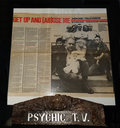 Get up and Abuse me, Article by Chris Bohn
Psychic TV
Get up and Abuse me, Article by Chris Bohn
Psychic TV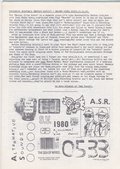 Gig-Review in Damn Latin No.7 by Peter Polanyk
Throbbing Gristle
Gig-Review in Damn Latin No.7 by Peter Polanyk
Throbbing Gristle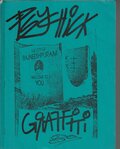 Graffiti
Psychic TV
Graffiti
Psychic TV Guildhall Northampton Poster
Throbbing Gristle
Hang Loose with Coil
Coil
Guildhall Northampton Poster
Throbbing Gristle
Hang Loose with Coil
Coil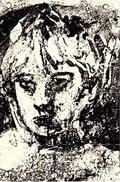 Hang Loose with Coil Mag-Add
Coil
Hang Loose with Coil Mag-Add
Coil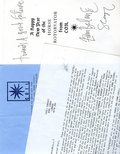 Happy New Year Greetings
Coil
Happy New Year Greetings
Coil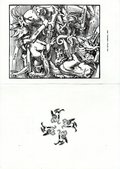 Happy New year Info
Coil
Happy New year Info
Coil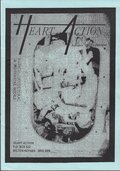 Heart Action Autumn 1993 and Mailorder 1991
Psychic TV
Heart Action Autumn 1993 and Mailorder 1991
Psychic TV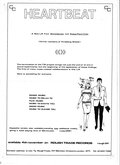 Heartbeat Flyer
Chris and Cosey
Heartbeat Flyer
Chris and Cosey Heartbeat Postcard
Chris and Cosey
Heartbeat Postcard
Chris and Cosey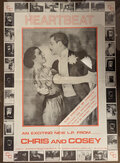 Heartbeat Promo Poster
Chris and Cosey
Heartbeat Promo Poster
Chris and Cosey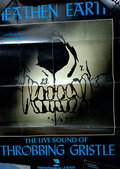 Heathen Earth Poster
Throbbing Gristle
Heathen Earth Poster
Throbbing Gristle Heaven and Lyceum 1980 and 81 Photos by Akiko Hada
Throbbing Gristle
Heaven and Lyceum 1980 and 81 Photos by Akiko Hada
Throbbing Gristle Hipgnosis Postcard 8Peter Christopherson)
Coum Transmissions
Hipgnosis Postcard 8Peter Christopherson)
Coum Transmissions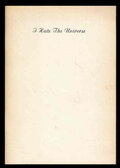 I hate the Universe. Eine New Wave Songtext Anthologie
Sylvia James
I hate the Universe. Eine New Wave Songtext Anthologie
Sylvia James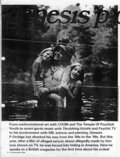 i-D Article
Psychic TV
i-D Article
Psychic TV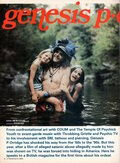 I-D no. 110 – november 1992 "The Sexuality Issue", pp. 76-77: Jim McClennan: Genesis P Orridge – sexual exile
Psychic TV
I-D no. 110 – november 1992 "The Sexuality Issue", pp. 76-77: Jim McClennan: Genesis P Orridge – sexual exile
Psychic TV in Anticipation of the first Transmission Card
Psychic TV
Independent on Sunday (23 February 1992)
Psychic TV
in Anticipation of the first Transmission Card
Psychic TV
Independent on Sunday (23 February 1992)
Psychic TV Industral Records Newsletters
Throbbing Gristle
Industral Records Newsletters
Throbbing Gristle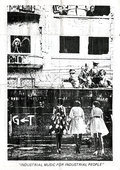 Industrial Music for Industrial People Poster
Throbbing Gristle
Industrial Music for Industrial People Poster
Throbbing Gristle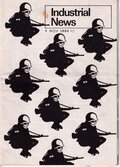 Industrial News 4 November 1980
Throbbing Gristle
Industrial News 4 November 1980
Throbbing Gristle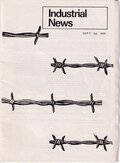 Industrial News Sept 3rd 1979
Throbbing Gristle
Industrial News Sept 3rd 1979
Throbbing Gristle Industrial Records Postcard
Throbbing Gristle
Industrial Records Postcard
Throbbing Gristle Industrial Records Staff
Throbbing Gristle
Industrial Records Staff
Throbbing Gristle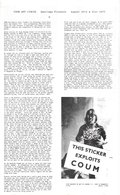 Info-Sheets to fLuxshoe Event 1973 (Hastings)
Coum Transmissions
Info-Sheets to fLuxshoe Event 1973 (Hastings)
Coum Transmissions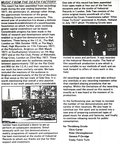 Info-Sticker to Second Annual Report
Throbbing Gristle
Info-Sticker to Second Annual Report
Throbbing Gristle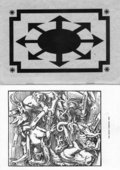 Information 2
Coil
Information 2
Coil Insert to 24 Hour Box (but unsigned)
Throbbing Gristle
Insert to 24 Hour Box (but unsigned)
Throbbing Gristle Invitation Card for Heathen Earth Studio Recording
Throbbing Gristle
Invitation Card to Prostiution Show
Coum Transmissions
Invitation Card for Heathen Earth Studio Recording
Throbbing Gristle
Invitation Card to Prostiution Show
Coum Transmissions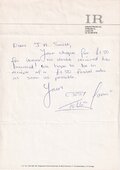 IR Letter from Cosey re bounced cheque
Throbbing Gristle
IR Letter from Cosey re bounced cheque
Throbbing Gristle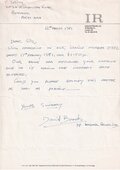 IR Letter from David Brooks re returned cheque 12th March 1981
Throbbing Gristle
IR Letter from David Brooks re returned cheque 12th March 1981
Throbbing Gristle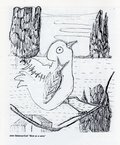 John Balance Drawings in Cassette Mythos
Coil
John Balance Drawings in Cassette Mythos
Coil John Balance Memorial card 2004
Coil
John Balance Memorial card 2004
Coil John Peel on COUM
Coum Transmissions
John Peel on COUM
Coum Transmissions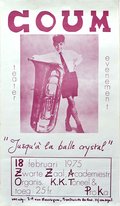 Jusqu a la balle Crystal Poster 18 Feb. 1975
Coum Transmissions
Jusqu a la balle Crystal Poster 18 Feb. 1975
Coum Transmissions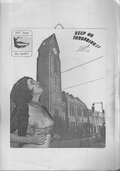 Keep on Throbbing COllage
Coum Transmissions
Keep on Throbbing COllage
Coum Transmissions Kezar Pavillon Ticket
Throbbing Gristle
Kozmik Blues
William S. Burroughs
Kezar Pavillon Ticket
Throbbing Gristle
Kozmik Blues
William S. Burroughs Künstler Machen Fahnen 1974 Rottweil Stadtfest
Coum Transmissions
Künstler Machen Fahnen 1974 Rottweil Stadtfest
Coum Transmissions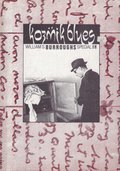 Közmik Blues Burroughs Special
William S. Burroughs
Közmik Blues Burroughs Special
William S. Burroughs Leaflet Spiellinie Kiellinie, 21 – 29 Juni 1975, with COUM listing. Single sheet folded to make 8 pages 21 x 10.5 cm.
Coum Transmissions
Leaflet Spiellinie Kiellinie, 21 – 29 Juni 1975, with COUM listing. Single sheet folded to make 8 pages 21 x 10.5 cm.
Coum Transmissions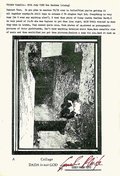 Letter and Postcard from Gen to Trev of Outlet magazine
Throbbing Gristle & Genesis P-Orridge
Letter and Postcard from Gen to Trev of Outlet magazine
Throbbing Gristle & Genesis P-Orridge Letter by Daily Mirror to Ted Little (ICA coordinator and responsible for the Prostition Sho of Coum Transmissions
Coum Transmissions
Letter by Daily Mirror to Ted Little (ICA coordinator and responsible for the Prostition Sho of Coum Transmissions
Coum Transmissions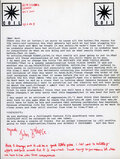 Letter John Balance to Mark Lally
Coil
Letter John Balance to Mark Lally
Coil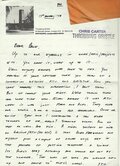 Letters by Chris Carter
Throbbing Gristle
Letters by Chris Carter
Throbbing Gristle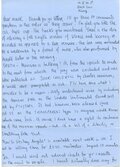 Letters from Geoff Balance of COIL to Mark Lally of Frux and the magazine They're Coming to take me away ha ha from 1984
Coil
Letters from Geoff Balance of COIL to Mark Lally of Frux and the magazine They're Coming to take me away ha ha from 1984
Coil Listen Today Promo Card A5
Psychic TV
Listen Today Promo Card A5
Psychic TV Live at Leeds Fan Club Flyer (with Clock DVA / Monte Cazza)
Throbbing Gristle
Live at Leeds Fan Club Flyer (with Clock DVA / Monte Cazza)
Throbbing Gristle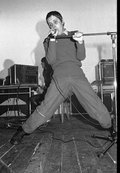 Live Germany Tour, Photos by Arg/Gee Gleim
Throbbing Gristle
Live Germany Tour, Photos by Arg/Gee Gleim
Throbbing Gristle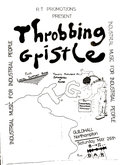 Live Guildhall Northampton Flyer
Throbbing Gristle
Live Guildhall Northampton Flyer
Throbbing Gristle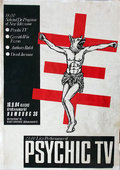 Live Hamburg 1984
Psychic TV
Live in Berllin 83
Psychic TV
Live Hamburg 1984
Psychic TV
Live in Berllin 83
Psychic TV Live Leeds Flyer
Throbbing Gristle
Live Photo
Psychic TV
Live Leeds Flyer
Throbbing Gristle
Live Photo
Psychic TV Live photos to Rafters Gig by Throbbing Gristle 4.Dec.1980
Throbbing Gristle
Live photos to Rafters Gig by Throbbing Gristle 4.Dec.1980
Throbbing Gristle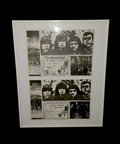 Live Posters 7th of April 1979 and 3rd of September 1979
Throbbing Gristle
Live Posters 7th of April 1979 and 3rd of September 1979
Throbbing Gristle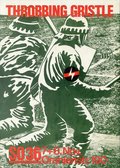 Live SO36 Poster
Throbbing Gristle
Live SO36 Poster
Throbbing Gristle Love & Lust postcards
Chris and Cosey
LSD NRG Stickers
Psychic TV
Love & Lust postcards
Chris and Cosey
LSD NRG Stickers
Psychic TV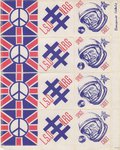 LSG NRG
Psychic TV
LSG NRG
Psychic TV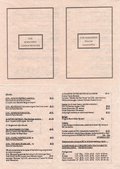 Mailorder-Catalogue 87
Coil
Mailorder-Catalogue 87
Coil Mary Bell Postcard to Cazazza 7inch on Industrial
Val Denham
Mary Bell Postcard to Cazazza 7inch on Industrial
Val Denham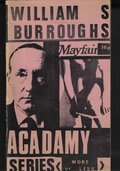 Mayfair Academy Series
William S. Burroughs
Mayfair Academy Series
William S. Burroughs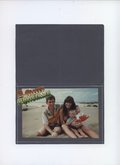 Merry Christmas Postcard to Kevin Thorne
Chris and Cosey
Merry Christmas Postcard to Kevin Thorne
Chris and Cosey Mission is Terminated postcard
Throbbing Gristle
Mission is Terminated postcard
Throbbing Gristle Moors Murder article
Coum Transmissions
Moors Murder article
Coum TransmissionsMUM and DAD PASTCORD Coum Transmissions
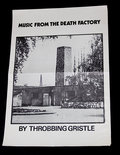 Music from the Death Factory
Throbbing Gristle
Music from the Death Factory
Throbbing Gristle Musick to Play in the Dark Vol 1 postcard
Coil
Musick to Play in the Dark Vol 1 postcard
Coil Muzik Fantastique postcard November 1992
Chris and Cosey
Muzik Fantastique postcard November 1992
Chris and Cosey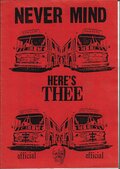 Never Mind here is thee official...
Psychic TV
Never Mind here is thee official...
Psychic TV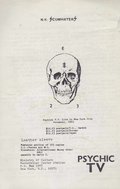 NY Scum Haters Tape Add
Psychic TV
NY Scum Haters Tape Add
Psychic TV Observer article 16 February 1992
Psychic TV
Observer article 16 February 1992
Psychic TV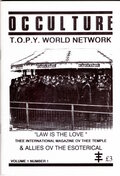 OCCULTURE T.O.P.Y. World Network - Volume 1, Number 1
Psychic TV
OCCULTURE T.O.P.Y. World Network - Volume 1, Number 1
Psychic TV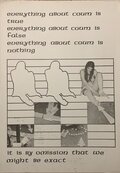 Omission - Everything about COUM is true Flyer
Coum Transmissions
Omission - Everything about COUM is true Flyer
Coum Transmissions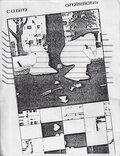 Ommissions Poster
Coum Transmissions
Ommissions Poster
Coum Transmissions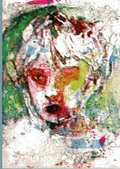 Open the Bloodgate
Coil
Open the Bloodgate
Coil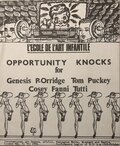 Opportunity Knocks Flyer
Coum Transmissions
Opportunity Knocks Flyer
Coum Transmissions Oreiginal Telegram Show Offer 1981 for Roma to Peter Christopherson
Throbbing Gristle
Oreiginal Telegram Show Offer 1981 for Roma to Peter Christopherson
Throbbing Gristle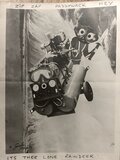 original COum Archive Photo of Gen Collage
Coum Transmissions
original COum Archive Photo of Gen Collage
Coum Transmissions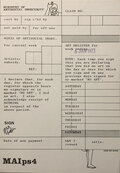 Original Ministry Of AntiSocial Insecurty Form
Coum Transmissions
Original Ministry Of AntiSocial Insecurty Form
Coum Transmissions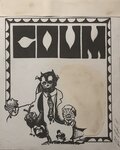 Original Mockup signed and stamped later
Coum Transmissions
Original Mockup signed and stamped later
Coum Transmissions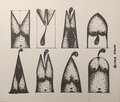 original Penis Postcard
Coum Transmissions
original Penis Postcard
Coum Transmissions Performance Los Angeles 1976. Report in Curtains Mag
Coum Transmissions
Performance Los Angeles 1976. Report in Curtains Mag
Coum Transmissions Personality card 1981
Throbbing Gristle
Personality card 1981
Throbbing Gristle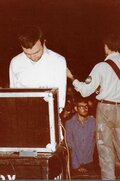 Photo
Peter Christopherson
Photo
Peter Christopherson Photo of members
Throbbing Gristle
Photo of members
Throbbing Gristle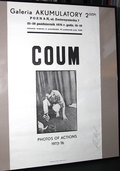 Photos of Actions 1973-76 for Galeria Akumulatory 2
Coum Transmissions
Photos of Actions 1973-76 for Galeria Akumulatory 2
Coum Transmissions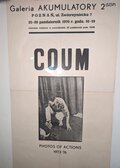 Photos of Actions 1973-76 for Galeria Akumulatory 2. (original unsigned edition)
Coum Transmissions
Photos of Actions 1973-76 for Galeria Akumulatory 2. (original unsigned edition)
Coum Transmissions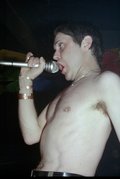 Photos of Gen in Throbbing Gristle 1980 (at Heaven)
Genesis P-Orridge
Photos of Gen in Throbbing Gristle 1980 (at Heaven)
Genesis P-Orridge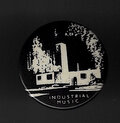 Pin 1 (Industrial Music)
Throbbing Gristle
Pin 1 (Industrial Music)
Throbbing Gristle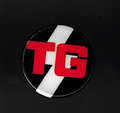 Pin 2 (TG Logo red)
Throbbing Gristle
Pin 2 (TG Logo red)
Throbbing Gristle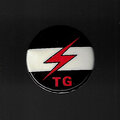 Pin 3 (TG Logo red with symbol)
Throbbing Gristle
Pin 3 (TG Logo red with symbol)
Throbbing Gristle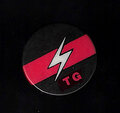 Pin 4 (TG with white symbol)
Throbbing Gristle
Pin 4 (TG with white symbol)
Throbbing Gristle Portrait Photo
Throbbing Gristle
Portrait Photo
Throbbing Gristle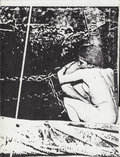 Postcard
Coum Transmissions
Postcard
Coum Transmissions Postcard to Mark
Throbbing Gristle & Genesis P-Orridge
Postcard to Mark
Throbbing Gristle & Genesis P-Orridge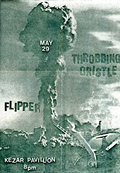 Poster 1981-05-29 USA-California-San Francisco Kezar Pavilion
Throbbing Gristle
Poster 1981-05-29 USA-California-San Francisco Kezar Pavilion
Throbbing Gristle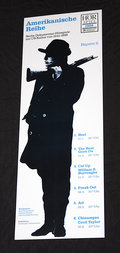 Poster Amerikanische Reihe Bayern 2
William S. Burroughs
Poster Amerikanische Reihe Bayern 2
William S. Burroughs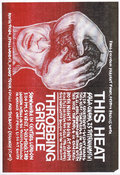 Poster Butler's Warf 23th December 1979
Throbbing Gristle
Poster Butler's Warf 23th December 1979
Throbbing Gristle Poster by Genesis P Orridge (Assume Power Focus)
Throbbing Gristle
Poster by Genesis P Orridge (Assume Power Focus)
Throbbing Gristle Poster Centro Iberico
Throbbing Gristle
Poster Centro Iberico
Throbbing Gristle Poster Centro Iberico
Throbbing Gristle
Poster Centro Iberico
Throbbing Gristle Poster Club 950 26th of April
Psychic TV
Poster Club 950 26th of April
Psychic TV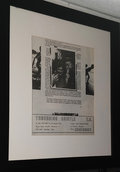 Poster for 19th May 1979 Manchester Factory
Throbbing Gristle
Poster for 19th May 1979 Manchester Factory
Throbbing Gristle Poster for 20 Jazz Funk Greats
Throbbing Gristle
Poster for 20 Jazz Funk Greats
Throbbing Gristle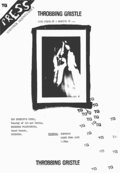 Poster for Control Agents to Throbbing Gristle - Brighton Polytech (26 March 1977)
Throbbing Gristle
Poster for Control Agents to Throbbing Gristle - Brighton Polytech (26 March 1977)
Throbbing Gristle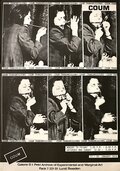 Poster for Galerie S:t Petri Archive of Experimental and Marginal Art, 1978, Lund, Sweden
Coum Transmissions
Poster for Galerie S:t Petri Archive of Experimental and Marginal Art, 1978, Lund, Sweden
Coum Transmissions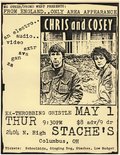 Poster for Stache's Performance, Columbus Ohio, 1.5.1986
Chris and Cosey
Poster for Stache's Performance, Columbus Ohio, 1.5.1986
Chris and Cosey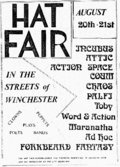 Poster for TG's second Gig at Hat Fare Winchester 21.st of August 1976
Throbbing Gristle
Poster for TG's second Gig at Hat Fare Winchester 21.st of August 1976
Throbbing Gristle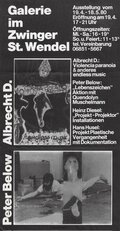 Poster Galerie im Zwinger (with Peter Below)
Albrecht/d
Poster Galerie im Zwinger (with Peter Below)
Albrecht/d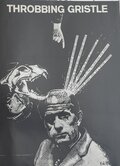 Poster Goldsmith College
Throbbing Gristle
Poster Goldsmith College
Throbbing Gristle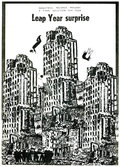 Poster industrial Records Present a Final Solution for your LEAP YEAR SURPRISE
Throbbing Gristle
Poster industrial Records Present a Final Solution for your LEAP YEAR SURPRISE
Throbbing Gristle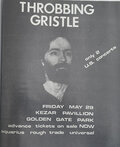 Poster Kezar Pavillion Golden Gate Park 29th May 1981
Throbbing Gristle
Poster Kezar Pavillion Golden Gate Park 29th May 1981
Throbbing Gristle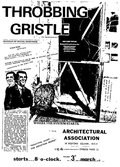 Poster Live 3.March 1978 Architectural Association
Throbbing Gristle
Poster Live 3.March 1978 Architectural Association
Throbbing Gristle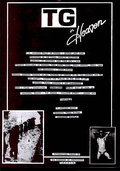 Poster Live HEAVEN 23.December 1980
Throbbing Gristle
Poster Live HEAVEN 23.December 1980
Throbbing Gristle Poster London Scala Cinema 1980-02-29
Throbbing Gristle
Poster London Scala Cinema 1980-02-29
Throbbing Gristle Poster Mayor I may resign
Throbbing Gristle
Poster Mayor I may resign
Throbbing Gristle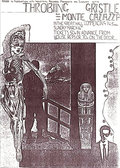 Poster Oundle School 16th March 1980
Throbbing Gristle
Poster Oundle School 16th March 1980
Throbbing Gristle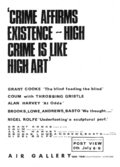 Poster Throbbing Gristle At the Air Gallery/Winchester 6th July 1976
Throbbing Gristle
Poster Throbbing Gristle At the Air Gallery/Winchester 6th July 1976
Throbbing Gristle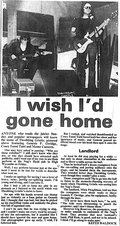 Press Clipping to 3rd performance at Nag's Head Wycombe, 11 February 1977
Throbbing Gristle
Press Clipping to 3rd performance at Nag's Head Wycombe, 11 February 1977
Throbbing Gristle Press Clippings
Throbbing Gristle
Press Clippings
Throbbing Gristle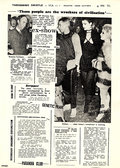 Press Clippings to Prostitution Show at ICA
Throbbing Gristle
Press Clippings to Prostitution Show at ICA
Throbbing Gristle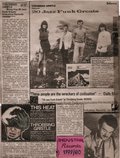 Press Clips 79/80
Throbbing Gristle
Press Clips 79/80
Throbbing Gristle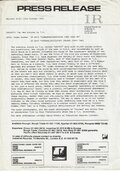 Press Release Sub Human Adrenalin
Throbbing Gristle
Press Release Sub Human Adrenalin
Throbbing Gristle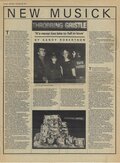 Press-clipping in Sounds 26.Nov 1977 (Sandy Robertson Article)
Throbbing Gristle
Private view card for 'Prostitution' an exhibition by Coum Transmissions at the ICA 18th October 1976
Coum Transmissions
Press-clipping in Sounds 26.Nov 1977 (Sandy Robertson Article)
Throbbing Gristle
Private view card for 'Prostitution' an exhibition by Coum Transmissions at the ICA 18th October 1976
Coum Transmissions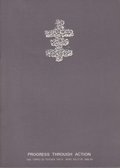 Progress through Action
Psychic TV
Progress through Action
Psychic TV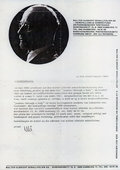 Promo Info-Sheet to Journey Through a Body Lp
Throbbing Gristle
Promo Info-Sheet to Journey Through a Body Lp
Throbbing Gristle Promo Photo Rough Trade 1981
Chris and Cosey
Promo Photo Rough Trade 1981
Chris and Cosey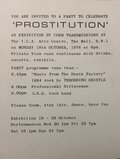 Promo Postcard to Simon Fords "Wreckers of Civilisation Book"
Throbbing Gristle
Promo Postcard to Simon Fords "Wreckers of Civilisation Book"
Throbbing GristlePromo-Poster for three Industrial releases Throbbing Gristle Prostituion Info Sheet Coum Transmissions
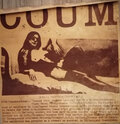 Prostitution Poster
Coum Transmissions
Prostitution Poster
Coum Transmissions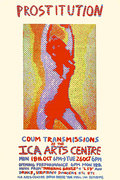 Prostitution Poster IVA 1976
Coum Transmissions
Prostitution Poster IVA 1976
Coum Transmissions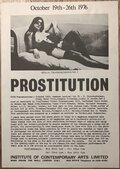 prostitution Show Flyer
Coum Transmissions
prostitution Show Flyer
Coum Transmissions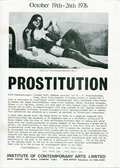 Prostitution Show Flyer, Presccutting, Invitation
Coum Transmissions
Prostitution Show Flyer, Presccutting, Invitation
Coum Transmissions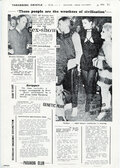 Prostitution Walkerprint publicity card /press cuttings) / invitation and announcement and ticket
Coum Transmissions
Prostitution Walkerprint publicity card /press cuttings) / invitation and announcement and ticket
Coum Transmissions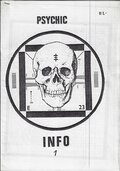 Psychic Info 1
Psychic TV
Psychic TV + A Certain Ratio printed flyer 17th August 1984 Hammersmith Town Hall. 193 x 142 mm
Psychic TV
Psychic Info 1
Psychic TV
Psychic TV + A Certain Ratio printed flyer 17th August 1984 Hammersmith Town Hall. 193 x 142 mm
Psychic TV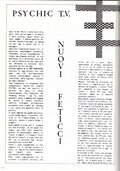 Psychic TV article in Trance No.2
Psychic TV
Psychic TV article in Trance No.2
Psychic TV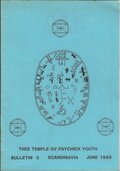 Psychic TV Bulletin 3 (Scnadinavia)
Psychic TV
Psychic TV Bulletin 3 (Scnadinavia)
Psychic TV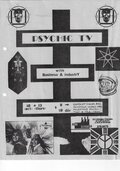 Psychic TV Flyer for concert with Business & Industry
Psychic TV
Psychic TV Flyer for concert with Business & Industry
Psychic TV Psychic TV NME 17 December 1983
Psychic TV
Psychic TV NME 17 December 1983
Psychic TV Psychic TV NME 26 April 1986
Psychic TV
Psychic TV NME 26 April 1986
Psychic TV Psychic TV Sounds 13 September 1986
Psychic TV
Psychic TV Sounds 13 September 1986
Psychic TV Publicity Card signed
Throbbing Gristle
Publicity Card signed
Throbbing Gristle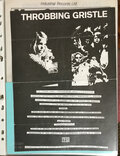 Rafters Poster and Ticket signed
Throbbing Gristle
Rafters Poster and Ticket signed
Throbbing Gristle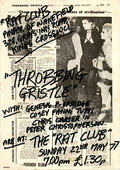 Rat Club Poster 22 May, 1977
Throbbing Gristle
Rat Club Poster 22 May, 1977
Throbbing Gristle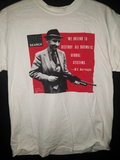 RE/Research T-Shirt
William S. Burroughs
RE/Research T-Shirt
William S. Burroughs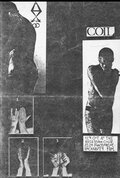 Recession Club Poster
Coil
Recession Club Poster
Coil Rectum As Inner Space (Made on a Bed of Lies) Postcard (part of Image bank Postcard Set)
Coum Transmissions
Rectum As Inner Space (Made on a Bed of Lies) Postcard (part of Image bank Postcard Set)
Coum Transmissions Rectum As Inner Space Poster (Maid on a Bed of Lies)
Coum Transmissions
Rectum As Inner Space Poster (Maid on a Bed of Lies)
Coum Transmissions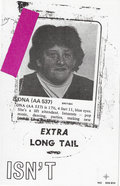 REMEMBER “EDNA AND THEE GREAT SURFERS” Extra Long Tail Postcard
Coum Transmissions
REMEMBER “EDNA AND THEE GREAT SURFERS” Extra Long Tail Postcard
Coum Transmissions Remote Viewer Delay Card
Coil
Remote Viewer Delay Card
Coil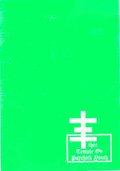 Restricted Internal Dokument
Psychic TV
Restricted Internal Dokument
Psychic TV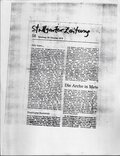 Reviww to ICA performance "Prostitution" in Stuggarter Tageszeitung
Coum Transmissions
Reviww to ICA performance "Prostitution" in Stuggarter Tageszeitung
Coum Transmissions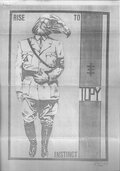 Rise to Instinct
Psychic TV
Rise to Instinct
Psychic TV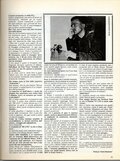 ROCKERILLA n. 21, Febbraio 1982, Rockerilla publishing, Cairo Montenotte, Italy,
Psychic TV
ROCKERILLA n. 21, Febbraio 1982, Rockerilla publishing, Cairo Montenotte, Italy,
Psychic TV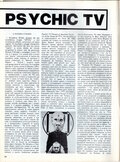 ROCKERILLA n. 40, Dec 1983, Rockerilla publishing, Cairo Montenotte, Italy,
Psychic TV
ROCKERILLA n. 40, Dec 1983, Rockerilla publishing, Cairo Montenotte, Italy,
Psychic TV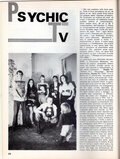 ROCKERILLA n. 49, Sept 1984, Rockerilla publishing, Cairo Montenotte, Italy,
Psychic TV
ROCKERILLA n. 49, Sept 1984, Rockerilla publishing, Cairo Montenotte, Italy,
Psychic TV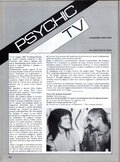 ROCKERILLA n. 64, December 1985, Rockerilla publishing, Cairo Montenotte, Italy,
Psychic TV
ROCKERILLA n. 64, December 1985, Rockerilla publishing, Cairo Montenotte, Italy,
Psychic TV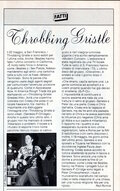 ROCKSTAR N. 12, Sept 1981, Actual media, Roma, Italy, p. 14: Red Ronnie, Throbbing Gristle (re TG end)
Throbbing Gristle
ROCKSTAR N. 12, Sept 1981, Actual media, Roma, Italy, p. 14: Red Ronnie, Throbbing Gristle (re TG end)
Throbbing Gristle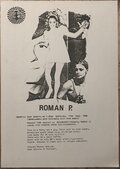 Roman P Promo Sheet
Psychic TV
Roman P Promo Sheet
Psychic TVRoosevelt after Inauguration William S. Burroughs
 Sacred Music from the Death Factory envelope
Throbbing Gristle
Sacred Music from the Death Factory envelope
Throbbing Gristle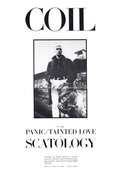 Scatology Poster
Coil
Scatology Poster
Coil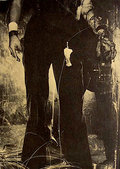 Scenes of Victory 1973-77 Invitation-flyer for Vernissage at Atelier Milchstrasse, Freiburg
Coum Transmissions
Scenes of Victory 1973-77 Invitation-flyer for Vernissage at Atelier Milchstrasse, Freiburg
Coum Transmissions Scrapbook Vol.1
Psychic TV
Scrapbook Vol.1
Psychic TV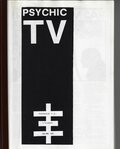 Scrapbook Vol.2
Psychic TV
Scrapbook Vol.2
Psychic TV Second Annual Report Sticker
Throbbing Gristle
Second Annual Report Sticker
Throbbing Gristle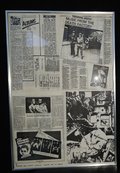 selected Industrial Records Press Clippings
Throbbing Gristle
selected Industrial Records Press Clippings
Throbbing Gristle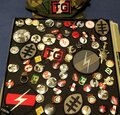 selected Pins and Badges by TG, PTV, Coum
Throbbing Gristle
selected Pins and Badges by TG, PTV, Coum
Throbbing Gristle Selected postcards and posters etc
Coum Transmissions
Selected postcards and posters etc
Coum Transmissions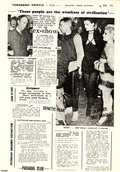 selected Press Cuttings Poster ICA October 1976
Throbbing Gristle
selected Press Cuttings Poster ICA October 1976
Throbbing Gristle selected press to the Prositition event
Coum Transmissions
selected press to the Prositition event
Coum Transmissions selected Promo Material
Vagina Dentata Organ
selected Promo Material
Vagina Dentata Organ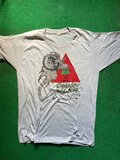 selected Psychic TV and Charlews Manson Aleister Corwley and Jim Jones related Shirts from Jordi Valls
Psychic TV
selected Psychic TV and Charlews Manson Aleister Corwley and Jim Jones related Shirts from Jordi Valls
Psychic TV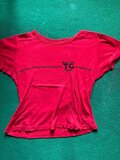 selected Throbbing Gristle and related Shirts from Jordi Valls
Throbbing Gristle
selected Throbbing Gristle and related Shirts from Jordi Valls
Throbbing Gristle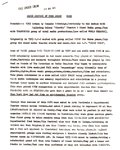 Selected Writings (compiled and scanned by Simon Dell)
Coum Transmissions
Selected Writings (compiled and scanned by Simon Dell)
Coum Transmissions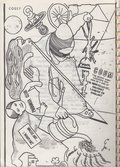 Self-Portrait in Robin Crozier Mail-Art-Mag "Portraits" of 1976
Coum Transmissions
Self-Portrait in Robin Crozier Mail-Art-Mag "Portraits" of 1976
Coum Transmissions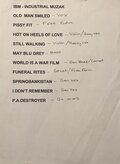 Setlist for Reunion Show
Throbbing Gristle
Setlist for Reunion Show
Throbbing Gristle several Concert Flyers
Throbbing Gristle
several Concert Flyers
Throbbing GristleSeveral Video-Tapes Throbbing Gristle
 signed Hotel Room Publicity Card
Throbbing Gristle
signed Hotel Room Publicity Card
Throbbing Gristle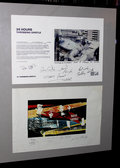 Signed Inserts to 24 Hour Tape-Box-Set
Throbbing Gristle
Signed Inserts to 24 Hour Tape-Box-Set
Throbbing Gristle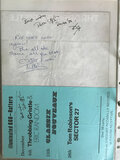 Signed Sheet for Rafters (never again....)
Throbbing Gristle
Signed Sheet for Rafters (never again....)
Throbbing Gristle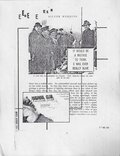 Silver Weddings
Coum Transmissions
Silver Weddings
Coum Transmissions six black and white photographs of environs of Hackney
Throbbing Gristle
six black and white photographs of environs of Hackney
Throbbing Gristle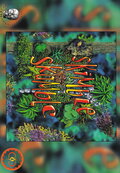 Skimble Skamble Postcard
Chris and Cosey
Skimble Skamble Postcard
Chris and Cosey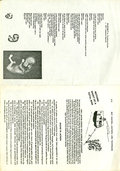 Slug Bait Flyer
Throbbing Gristle
Slug Bait Flyer
Throbbing Gristle SO36 Poster
Throbbing Gristle
SO36 Poster
Throbbing Gristle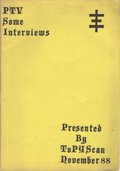 Some Interviews
Psychic TV
Some Interviews
Psychic TV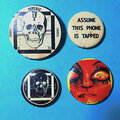 some Pins from early / mid 80's
Psychic TV
some Pins from early / mid 80's
Psychic TV some pre-TG / Coum related
Coum Transmissions
some pre-TG / Coum related
Coum Transmissions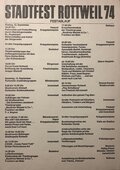 Stadtfest Rottweil 1974 Festival Flyer incl Coum
Coum Transmissions
Stadtfest Rottweil 1974 Festival Flyer incl Coum
Coum Transmissions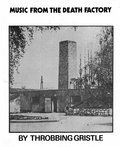 Sticker Music from the Death Factory and TG Logo Sticker
Throbbing Gristle
Sticker Music from the Death Factory and TG Logo Sticker
Throbbing Gristle Sticker TG
Throbbing Gristle
Sticker TG
Throbbing Gristle Sticker the Responsible Abuse of Pleasure
Coil
Sticker the Responsible Abuse of Pleasure
Coil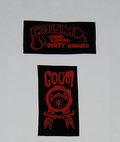 Stickers: "COUM YOUR LOCAL DIRTY BANNED" and COUM "Guarantee Disappointment"
Coum Transmissions
Stickers: "COUM YOUR LOCAL DIRTY BANNED" and COUM "Guarantee Disappointment"
Coum Transmissions Stolen and Contaminated Postcard
Coil
Stolen and Contaminated Postcard
Coil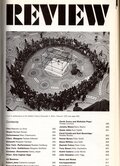 STUDIO INTERNATIONAL Vol. 191 no. 981 may-june 1976, Studio International, London:
Coum Transmissions
STUDIO INTERNATIONAL Vol. 191 no. 981 may-june 1976, Studio International, London:
Coum Transmissions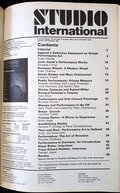 STUDIO INTERNATIONAL Vol. 192 no. 982 july-aug 1976, Studio International, London:
Coum Transmissions
STUDIO INTERNATIONAL Vol. 192 no. 982 july-aug 1976, Studio International, London:
Coum Transmissions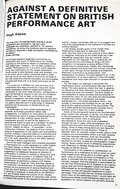 STUDIO INTERNATIONAL Vol. 192 no. 982 july-aug 1976, Studio International, London: Hugh Adams: Against a Definitive Statement on British Performance Art.
Coum Transmissions
STUDIO INTERNATIONAL Vol. 192 no. 982 july-aug 1976, Studio International, London: Hugh Adams: Against a Definitive Statement on British Performance Art.
Coum Transmissions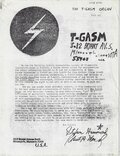 T-Gasm Issue 1
Throbbing Gristle
T-Gasm Issue 1
Throbbing Gristle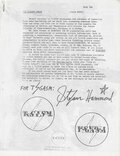 T-Gasm Issue 3
Throbbing Gristle
T-Gasm Issue 3
Throbbing GristleT-Gasm No.1-5 Throbbing Gristle
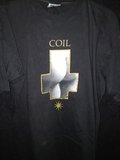 T-Shirt
Coil
T-Shirt - Fabulous Feast
Psychic TV
T-Shirt - Temple of Psychic Youth
Psychic TV
T-Shirt
Coil
T-Shirt - Fabulous Feast
Psychic TV
T-Shirt - Temple of Psychic Youth
Psychic TV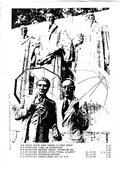 Tape-Overview
William S. Burroughs
Tape-Overview
William S. Burroughs Temple of Psychic Youth Bulletin 1 Summer 1989 - Progress Through Magick (Rapid Eye)
Psychic TV
Temple of Psychic Youth Bulletin 1 Summer 1989 - Progress Through Magick (Rapid Eye)
Psychic TV Temple of Psychic Youth Bulletin 2 (Rapid Eye)
Psychic TV
Temple of Psychic Youth Bulletin 2 (Rapid Eye)
Psychic TV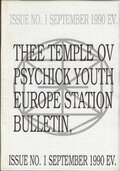 Temple of thee Psychic Youth Europe Station Bulletin 1
Psychic TV
Temple of thee Psychic Youth Europe Station Bulletin 1
Psychic TV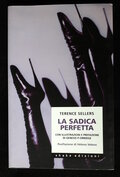 TERENCE SELLERS: La sadica perfetta (Shake edizioni, Milano 2007) 220 pp.,
Psychic TV
TERENCE SELLERS: La sadica perfetta (Shake edizioni, Milano 2007) 220 pp.,
Psychic TV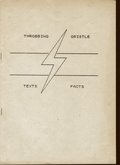 Text Facts
Throbbing Gristle
Text Facts
Throbbing Gristle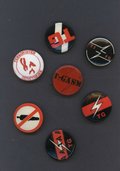 TG Buttons (each)
Throbbing Gristle
TG Buttons (each)
Throbbing Gristle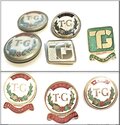 TG Enamels (not TG but Townswomen Guild)
Throbbing Gristle
TG Enamels (not TG but Townswomen Guild)
Throbbing Gristle TG Heaven Video Bootleg COver
Throbbing Gristle
TG Heaven Video Bootleg COver
Throbbing Gristle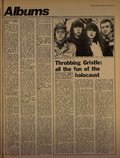 TG in Melodie Maker 23-12-78
Throbbing Gristle
TG in Melodie Maker 23-12-78
Throbbing Gristle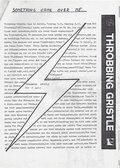 TG in Spät aber Doch
Throbbing Gristle
TG in Spät aber Doch
Throbbing Gristle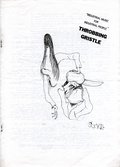 TG Interview (Part 1) with Genesis P Orridge in AURA Issue 1
Throbbing Gristle
TG Interview (Part 1) with Genesis P Orridge in AURA Issue 1
Throbbing Gristle TG Patches
Throbbing Gristle
TG Patches
Throbbing Gristle TG Questionnaire
Throbbing Gristle
TG Questionnaire
Throbbing Gristle TG Sticker
Throbbing Gristle
TG Sticker
Throbbing Gristle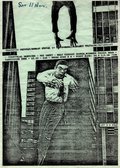 TG with Robert Rental the Normal Cabaret Voltaire and Metabolist at the Crypt 11.11.1980
Throbbing Gristle
TG with Robert Rental the Normal Cabaret Voltaire and Metabolist at the Crypt 11.11.1980
Throbbing Gristle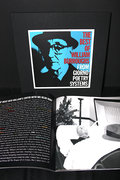 The Best of William S. Burroughs (Mouth Almighty Records) Box with Book and with 4CD's
William S. Burroughs
The Best of William S. Burroughs (Mouth Almighty Records) Box with Book and with 4CD's
William S. Burroughs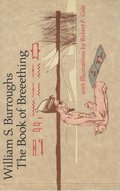 The Book of Breeeething (Overdrive Book) 1975
William S. Burroughs
The Book of Breeeething (Overdrive Book) 1975
William S. Burroughs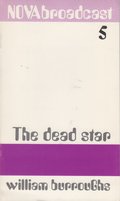 The Dead Star (Nova Broadcast 5) 1969
William S. Burroughs
The Dead Star (Nova Broadcast 5) 1969
William S. Burroughs The Industrial Revolution Sounds 1980
Throbbing Gristle
The Industrial Revolution Sounds 1980
Throbbing Gristle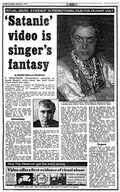 The Mail (23 February 1992)
Psychic TV
The Mail (23 February 1992)
Psychic TV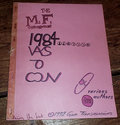 The MF Chronicle
Coum Transmissions
The MF Chronicle
Coum Transmissions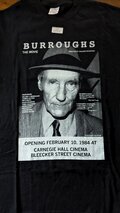 The Movie (Shirt)
William S. Burroughs
The Movie (Shirt)
William S. Burroughs The PM Generation
Skot Armst
The PM Generation
Skot Armst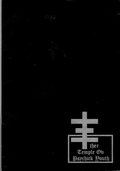 The SIgil Book second ed. 1988
Psychic TV
The SIgil Book second ed. 1988
Psychic TV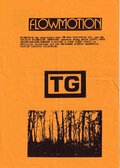 The TG Catalogue by Flowmotion Records
Throbbing Gristle
The TG Catalogue by Flowmotion Records
Throbbing Gristle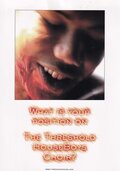 The Threshold HouseBoys Choir postcard
Coil
The Threshold HouseBoys Choir postcard
Coil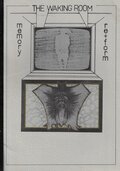 The Waking Room
Psychic TV
The Waking Room
Psychic TV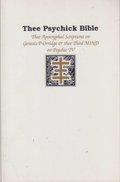 Thee Psychic Bible
Psychic TV
Thee Psychic Bible
Psychic TV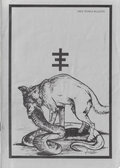 Thee Temple Bulletin 1984
Psychic TV
Thee Temple ov Psychic Youth
Psychic TV
Thee Temple Bulletin 1984
Psychic TV
Thee Temple ov Psychic Youth
Psychic TV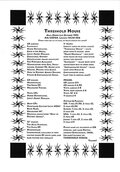 Threshold House mail order October 1992
Coil
Threshold House mail order October 1992
Coil Throbbing Gristle Forgive Us Our Synths Sounds 1981
Throbbing Gristle
Throbbing Gristle Forgive Us Our Synths Sounds 1981
Throbbing GristleThrobbing Gristle Pin Throbbing Gristle
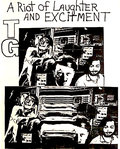 Throbbing Gristle Promo-Poster (A Riot of Laughter)
Throbbing Gristle
Throbbing Gristle Promo-Poster (A Riot of Laughter)
Throbbing Gristle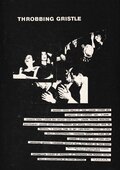 Throbbing Gristle Psychic Youth Rally at Thee Lyceum 8th February 1981
Throbbing Gristle
Throbbing Gristle Psychic Youth Rally at Thee Lyceum 8th February 1981
Throbbing Gristle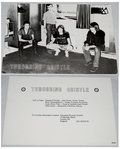 Throbbing Gristle Publicity Card, hotel room. 302 x 211 mm.
Throbbing Gristle
Throbbing Gristle Publicity Card, hotel room. 302 x 211 mm.
Throbbing Gristle Ticket for Northampton Guildhall
Throbbing Gristle
Ticket for Northampton Guildhall
Throbbing Gristle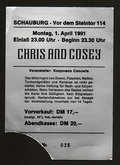 Ticket to 1991 Concert
Chris and Cosey
Ticket to 1991 Concert
Chris and Cosey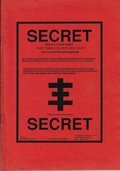 TOPY Coversheet
Psychic TV
TOPY Coversheet
Psychic TV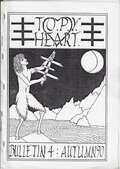 TOPY HEART Bulletin
Psychic TV
Topy Worls Network System
Psychic TV
TOPY HEART Bulletin
Psychic TV
Topy Worls Network System
Psychic TV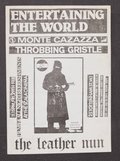 Tourposter "Entertaining the World" Tottenham Throbbing Gristle, Monte Cazzaza, Leather Nun
Throbbing Gristle
Tourposter "Entertaining the World" Tottenham Throbbing Gristle, Monte Cazzaza, Leather Nun
Throbbing Gristle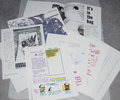 Transmedia (pre Coum Transmissions) Pictures and Documents
Coum Transmissions
Transmedia (pre Coum Transmissions) Pictures and Documents
Coum Transmissions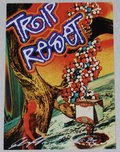 Trip Reset Postcard
Psychic TV
Trip Reset Postcard
Psychic TV Trip Reset Postcard Signed
Psychic TV
Trip Reset Postcard Signed
Psychic TV Two Concert Posters
Throbbing Gristle
Two Concert Posters
Throbbing Gristle two original Shirts
Throbbing Gristle
two original Shirts
Throbbing Gristle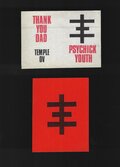 two stickers
Psychic TV
two stickers
Psychic TV Two Stickers (TG Symbol and Assume)
Throbbing Gristle
Two Stickers (TG Symbol and Assume)
Throbbing Gristle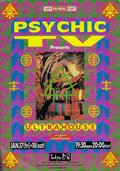 Ultrahouse Tokyo Poster / Add
Psychic TV
Ultrahouse Tokyo Poster / Add
Psychic TV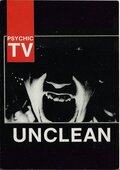 Unclean Postcard
Psychic TV
Unclean Postcard
Psychic TV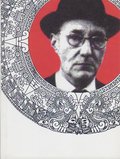 Unforgettable Characters (Xochi Press, 2001)
William S. Burroughs
Unforgettable Characters (Xochi Press, 2001)
William S. Burroughs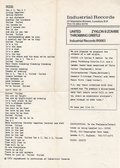 United / Zyklon B Lyric Sheet (came with early versions of United / Zyklon B 7inch)
Throbbing Gristle
United / Zyklon B Lyric Sheet (came with early versions of United / Zyklon B 7inch)
Throbbing Gristle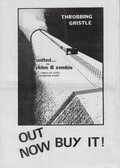 United / Zyklon B Promo Flyer
Throbbing Gristle
United / Zyklon B Promo Flyer
Throbbing Gristle United / Zyklon B Promo Poster
Throbbing Gristle
United / Zyklon B Promo Poster
Throbbing Gristle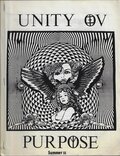 Unity of Purpose
Psychic TV
Unity of Purpose
Psychic TV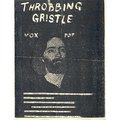 Veterans Auditorium 5-22-1981 Vox Pop Flyer
Throbbing Gristle
Veterans Auditorium 5-22-1981 Vox Pop Flyer
Throbbing Gristle Victims of..
Throbbing Gristle
Victims of..
Throbbing Gristle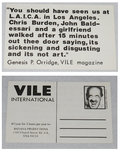 Vile International Postcard. Undated postcard (circa 1977).
Coum Transmissions
Vile International Postcard. Undated postcard (circa 1977).
Coum TransmissionsVintage Photo in Hotel Room (standing) Throbbing Gristle
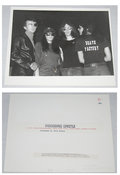 Vintage Throbbing Gristle ‘Death Factory’ Black and White photograph by Monte Cazazza. 10 x 8 inches. Circa 1977-78.
Throbbing Gristle
Vintage Throbbing Gristle ‘Death Factory’ Black and White photograph by Monte Cazazza. 10 x 8 inches. Circa 1977-78.
Throbbing Gristle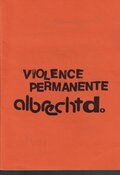 Violence Permanente
Albrecht/d
Violence Permanente
Albrecht/d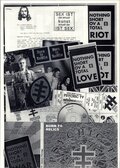 Vittore Baroni: Born To Relics (Near the Edge Editions, Viareggio, Italy 2011)
Psychic TV
Vittore Baroni: Born To Relics (Near the Edge Editions, Viareggio, Italy 2011)
Psychic TV Vittore Baroni: PSYCHIC TV – Genesis P - Orridge: A COUMprehensive Collection Ov Lyrics 1981-90
Psychic TV
Vittore Baroni: PSYCHIC TV – Genesis P - Orridge: A COUMprehensive Collection Ov Lyrics 1981-90
Psychic TV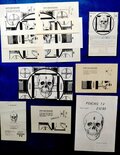 Vouchers to Live recordings
Psychic TV
Vouchers to Live recordings
Psychic TV Walter Hartmann Archiv pictures
Throbbing Gristle
Walter Hartmann Archiv pictures
Throbbing Gristle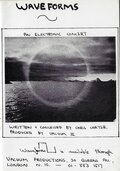 Waveforms Poster
Chris Carter
Waveforms Poster
Chris Carter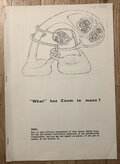 What has COUM to mean booklet
Coum Transmissions
What has COUM to mean booklet
Coum Transmissions Winston Spencer Churchill supergroup event 1973
Coum Transmissions
Winston Spencer Churchill supergroup event 1973
Coum Transmissions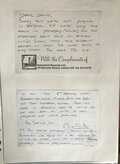 With Compliments Letter by Chris Carter to David Minshall
Chris Carter
With Compliments Letter by Chris Carter to David Minshall
Chris Carter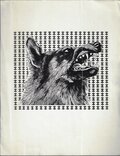 Wolves
Psychic TV
Wolves
Psychic TV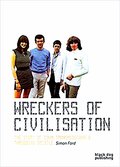 Wreckers of Civilisation
Throbbing Gristle
Wreckers of Civilisation
Throbbing Gristle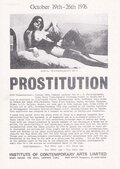 Wreckers of Civilisation Invitation Card for Book by Simon Ford
Coum Transmissions
Zürich 2002, photos by Daniel Straub und Isa Illek
Coil
Wreckers of Civilisation Invitation Card for Book by Simon Ford
Coum Transmissions
Zürich 2002, photos by Daniel Straub und Isa Illek
Coil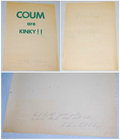 ‘COUM are KINKY!!’ Poster
Coum Transmissions
‘COUM are KINKY!!’ Poster
Coum Transmissions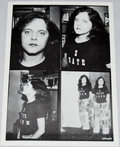 ‘E HATE COUM’ publicity card,
Coum Transmissions
‘E HATE COUM’ publicity card,
Coum Transmissions‘Weeping’ Lyrics by Throbbing Gristle 1978. A4 Vintage photocopy, age related tanning and couple of small rust marks on verso. Throbbing Gristle
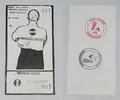 ´Ticket for Centro Iberico gig 21st January 1979. 110 x 57 mm
Throbbing Gristle
´Ticket for Centro Iberico gig 21st January 1979. 110 x 57 mm
Throbbing GristleRelated Labels
Industrial RecordsRelated Labels Persons
Chris CarterCosey Funny TuttiGenesis P OrridgeJohn Smith aka Ward PhilipsPeter ChristophersonRelated Labels-Literature
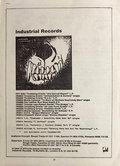 4 page Industrial Records promo-paper
Industrial Records
4 page Industrial Records promo-paper
Industrial Records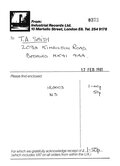 a selection of Invoices
Industrial Records
a selection of Invoices
Industrial Records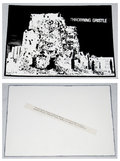 Black and white montage photograph, Industrial Records, circa 1977-78. 210 x 150 mm
Industrial Records
Black and white montage photograph, Industrial Records, circa 1977-78. 210 x 150 mm
Industrial Records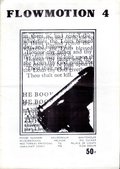 Flowmotion Number 4
Flowmotion
Flowmotion Number 6
Flowmotion
Flowmotion Number 4
Flowmotion
Flowmotion Number 6
Flowmotion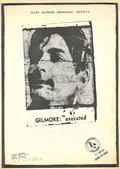 Gary Gilmore Memorial Society (Cosey Fanni Tutti, Monte Cazazza, Genesis P Orridge)
Industrial Records
Gary Gilmore Memorial Society (Cosey Fanni Tutti, Monte Cazazza, Genesis P Orridge)
Industrial Records Gary Gilmore Memorial Society Postcard
Industrial Records
Gary Gilmore Memorial Society Postcard
Industrial Records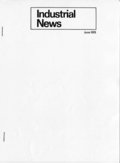 Industrial News 1 Juni 78
Industrial Records
Industrial News 1 Juni 78
Industrial RecordsIndustrial News 2 Juni 79 Industrial Records
Industrial News 3 Newsletter September 1979 Industrial Records
Industrial News 4 November 1980 Industrial Records
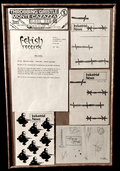 Industrial Newsletters framed plus Fetish Promo-Info to Discipline 12"
Industrial Records
Industrial Newsletters framed plus Fetish Promo-Info to Discipline 12"
Industrial Records Industrial Records Cassette Collection Overview
Industrial Records
Industrial Records Cassette Collection Overview
Industrial Records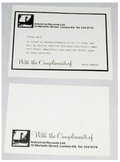 Industrial Records ephemera, two compliments slips, 159 x 128 mm and 148 x 107 mm
Industrial Records
Industrial Records ephemera, two compliments slips, 159 x 128 mm and 148 x 107 mm
Industrial RecordsIndustrial Records flyer 1979 promoting United 7inch / D.o.A. and Cazazza 7inch. 298 x 210 mm. Industrial Records
 Industrial Records Mail Order catalogue 1980/81. 8 pages including covers. Some creasing and annotated by customer. 21 x 15 cm
Industrial Records
Industrial Records Mail Order catalogue 1980/81. 8 pages including covers. Some creasing and annotated by customer. 21 x 15 cm
Industrial Records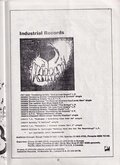 Industrial Records News Overview
Industrial Records
Industrial Records News Overview
Industrial Records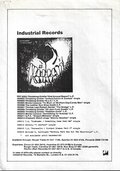 Industrial Records Overview releases 1980
Industrial Records
Industrial Records Overview releases 1980
Industrial Records Industrial Records Post Card. Undated (circa 1978). 102 x 150 mm
Industrial Records
Industrial Records Post Card. Undated (circa 1978). 102 x 150 mm
Industrial Records Industrial Records Postcard
Industrial Records
Industrial Records Postcard
Industrial Records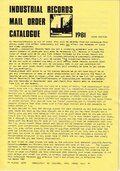 Inudstrial Records Mail Order Catalogue 1981
Industrial Records
Inudstrial Records Mail Order Catalogue 1981
Industrial Records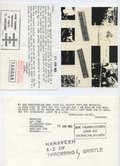 Nanavesh Infoletter
Nanavesh
Press Release Two TG 7inches
Industrial Records
Nanavesh Infoletter
Nanavesh
Press Release Two TG 7inches
Industrial RecordsPress Releases Industrial Records
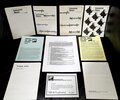 Printed Matter related to Industrial Records / Throbbing gristle
Industrial Records
Printed Matter related to Industrial Records / Throbbing gristle
Industrial Records Printed Matter related to IR / TG
Industrial Records
Printed Matter related to IR / TG
Industrial Records Printed Matter related to IR / TG
Industrial Records
Printed Matter related to IR / TG
Industrial Records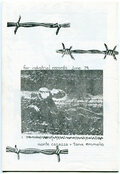 secret Cazazza Edition
Industrial Records
secret Cazazza Edition
Industrial Records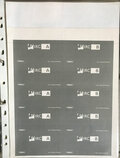 some more
Industrial Records
some more
Industrial Records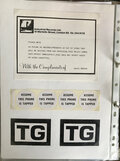 stickers and with Compliment sheet
Industrial Records
stickers and with Compliment sheet
Industrial Records Tape-Label sticker sheet
Industrial Records
Tape-Label sticker sheet
Industrial Records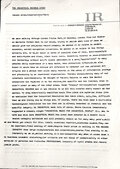 The Industrial Records Story
Industrial Records
The Industrial Records Story
Industrial Recordswith compliments cards Industrial Records
Related Press & Organisations
NanaveshStabmentalT-GasmRelated Press & Org Literature
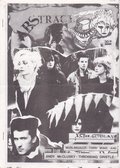 Abstract Magazine #2
Abstract Magazine
Abstract Magazine #2
Abstract Magazine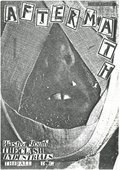 Aftermath No. 03
Aftermath
Aftermath No. 03
Aftermath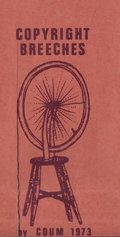 COUM Transmissions. Copyright Breeches
Beau Geste Press
COUM Transmissions. Copyright Breeches
Beau Geste PressDirt Issue 3 Dirt
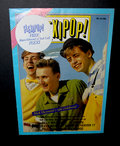 Flexipop No. 24 (with Marc Almond Flexi, Flexipop 23A)
Flexipop
Flexipop No. 24 (with Marc Almond Flexi, Flexipop 23A)
Flexipop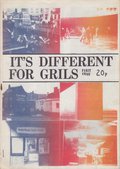 It's Different for Grils Issue One
It's Different for Grils
It's Different for Grils Issue One
It's Different for GrilsKakos 1 Kakos
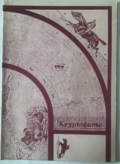 KRYPTOGAME NR. 1
KRYPTOGAME
KRYPTOGAME NR. 1
KRYPTOGAMENanavesh No.3 Nanavesh
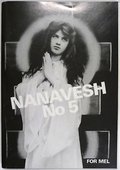 Nanavesh No.5
Nanavesh
Nanavesh No.5
Nanavesh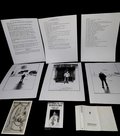 Nanavesh No.4
Nanavesh
Nanavesh No.4
Nanavesh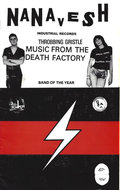 Nanavesh No.1
Nanavesh
Nanavesh No.1
Nanavesh Nanavesh No.5 Tape-Supplement
Nanavesh
Nanavesh No.5 Tape-Supplement
Nanavesh Nanavesh No.2
Nanavesh
Nanavesh No.2
Nanavesh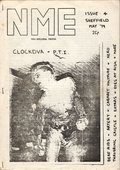 New Musickal Excess Issue 04
New Musickal Excess (NMX)
New Musickal Excess Issue 04
New Musickal Excess (NMX)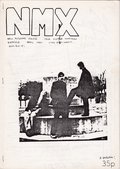 New Musickal Excess Issue 13
New Musickal Excess (NMX)
New Musickal Excess Issue 13
New Musickal Excess (NMX) New Musickal Excess Issue 05
New Musickal Excess (NMX)
New Musickal Excess Issue 05
New Musickal Excess (NMX)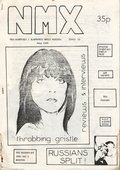 New Musickal Excess Issue 15 (July 1980)
New Musickal Excess (NMX)
New Musickal Excess Issue 15 (July 1980)
New Musickal Excess (NMX)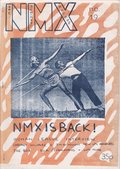 New Musickal Excess Issue 19
New Musickal Excess (NMX)
New Musickal Excess Issue 19
New Musickal Excess (NMX)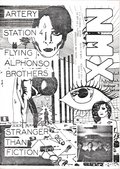 New Musickal Excess Issue 12
New Musickal Excess (NMX)
New Wave
New Wave
New Musickal Excess Issue 12
New Musickal Excess (NMX)
New Wave
New Wave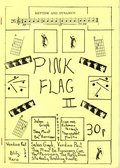 Pink Flag Issue 02
Pink Flag
Pink Flag Issue 02
Pink FlagRe/Search 1 RE/Search Publications
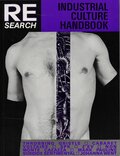 RE /Search Industrial Culture Handbook (second edition) blue cover
RE/Search Publications
RE /Search Industrial Culture Handbook (second edition) blue cover
RE/Search PublicationsSearch & Destroy No.06 RE/Search Publications
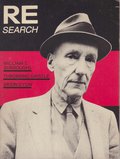 RE Search 4/5
RE/Search Publications
RE Search 4/5
RE/Search Publications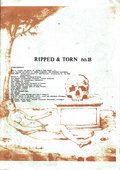 Ripped and Torn Issue 18
Ripped and Torn
Ripped and Torn Issue 18
Ripped and Torn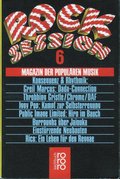 Rock Session 6 (rororo)
Rock Session
Rock Session 6 (rororo)
Rock Session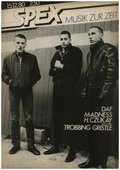 Spex 12/80
Spex
Spex 12/80
Spex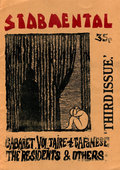 Stabmental 03
Stabmental
Stabmental 03
Stabmental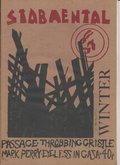 Stabmental 04/05
Stabmental
Stabmental 04/05
Stabmental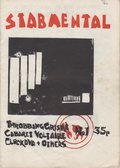 Stabmental 01
Stabmental
Stabmental 01
Stabmental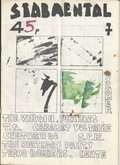 Stabmental 07
Stabmental
Stabmental 07
Stabmental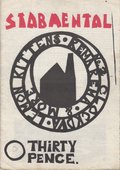 Stabmental 02
Stabmental
Stabmental 02
Stabmental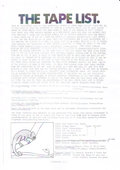 The Stabmental Tape List
Stabmental
The Stabmental Tape List
Stabmental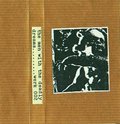 Stabmental 06
Stabmental
Subvert No. 03
Subvert
Stabmental 06
Stabmental
Subvert No. 03
Subvert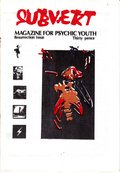 Subvert No. 04 (Ressurection Issue)
Subvert
Subvert No. 04 (Ressurection Issue)
Subvert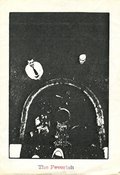 The Feverish Issue 3
the Feverish
The Feverish Issue 3
the Feverish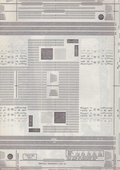 Vertical Reference Line No.10
Vertical Reference Line No.10
Vertical Reference Line No.10
Vertical Reference Line No.10
